Rulers
Index Db-Dh
Dbar, Dmitry (Sergeyevich) (b. July 5, 1984, Kecskemét, Hungary), interior minister of Abkhazia (2020- ).
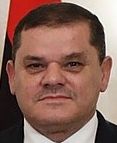
Dbeibah |
Dbeibah, Abdul Hamid Muhammad (b. 1959, Misurata, Libya), prime minister of Libya (2021- ).
De Aparici, Ricardo (José Manuel) (b. June 23, 1940, Guillermina, Santa Fe, Argentina - d. Dec. 19, 2019, San Salvador de Jujuy, Jujuy, Argentina), governor of Jujuy (1987-90).
De Biagi, Germano (b. Aug. 7, 1949, Domagnano, San Marino), captain-regent of San Marino (1979-80, 1983-84, 1992).
de Blasio, Bill, former legal name (1983-2002) Warren de Blasio-Wilhelm, original name Warren Wilhelm, Jr. (b. May 8, 1961, Manhattan, New York City), mayor of New York City (2014-22). In May 2019 he entered the race for the 2020 Democratic presidential nomination, dropping out in September.

De Bono |
De Bono, Emilio (Giuseppe Gaspare Giovanni) (b. March 19, 1866, Cassano d'Adda, Lombardia, Italy - d. Jan. 11, 1944, Verona, Italy), governor of Tripolitania (1925-29). He entered the Italian army in 1884 as a second lieutenant and rose to a place on the general staff in the Italo-Turkish war in Libya (1911). In World War I he distinguished himself against the Austrians at Gorizia (1916) and Grappa (October 1918). He was discharged with the rank of major general in 1920. He was among the earliest adherents of the Fascist movement and in 1922 was one of the quadrumvirs in the famous March on Rome, which signaled the beginning of the Fascist regime. After serving as chief of police and commander of the Fascist militia, he was appointed governor of Tripolitania in 1925 and in 1929 became minister for the colonies. He later admitted that as early as 1932 he and Benito Mussolini began seriously to contemplate forcing a war upon Ethiopia. When it broke out in October 1935, he was appointed commander in chief, but after six weeks he was replaced by the more talented Gen. Pietro Badoglio, though he was rewarded with the rank of field marshal. He became inspector of Italian overseas forces in 1939 and on the eve of Italy's entry into World War II he was put in charge of the group of armies of the south. Appointed minister of state in 1942, he participated in the historic meeting of the Fascist Grand Council (July 24/25, 1943) and was among those who voted against Mussolini, thus causing the leader's downfall. When Mussolini regained power in northern Italy with German help, he had De Bono arrested, tried for treason, and executed by a firing squad.
de Carnall, Carl Constantin (b. Sept. 12, 1757, Österbotten county, Finland - d. Aug. 6, 1832, Ulfsby socken, Åbo och Björneborg, Finland), governor of Vasa (1808-22).
De Ceuninck, Armand (Léopold Théodore) (b. May 27, 1858, Mechelen, Belgium - d. April 12, 1935, Brussels, Belgium), war minister of Belgium (1917-18).
de Chair, Sir Dudley Rawson Stratford (b. Aug. 30, 1864, Lennoxville, Canada East [now Quebec] - d. Aug. 17, 1958, Rottingdean, Sussex, England), governor of New South Wales (1924-30); knighted 1916.
De Clercq, Willy (Clarisse Elvire Hector, vicomte/burggraaf) (b. July 8, 1927, Ghent, Belgium - d. Oct. 28, 2011, Ghent), finance minister of Belgium (1973-77, 1981-85). He was also a deputy prime minister (1966-68, 1973-74, 1981-85) and minister of budget (1966-68) and European commissioner for external relations and trade (1985-89). He was made viscount in 2006.
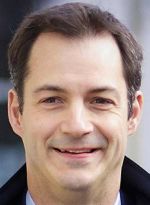
A. De Croo |
De Croo, Alexander (b. Nov. 3, 1975, Vilvoorde, Belgium), prime minister of Belgium (2020- ); son of Herman De Croo. He was also a deputy prime minister (2014-20) and finance minister (2018-20).
De Croo, Herman (Francies Joseph) (b. Aug. 12, 1937, Opbrakel [now part of Brakel], Belgium), Belgian politician. He was chairman of the Chamber of Representatives (1999-2007).
De Decker, Pierre Jacques François (b. Jan. 25, 1812, Zèle, France [now in Belgium] - d. Jan. 4, 1891, Brussels, Belgium), cabinet chief and interior minister of Belgium (1855-57). He was also governor of Limburg (1871).
De Falco, Giovanni (Raffaele Francesco) (b. May 28, 1818, Bracigliano, Two Sicilies [now in Campania, Italy] - d. Feb. 25, 1886, Naples, Italy), justice minister of Italy (1865-66, 1871-73).
De Filippo, Gennaro (b. Feb. 9, 1816, Naples, Kingdom of Naples [Italy] - d. June 29, 1887, Rome, Italy), justice minister of Italy (1868-69).
De Francisci, Pietro (b. Dec. 18, 1883, Rome, Italy - d. Jan. 31, 1971, Formia, Lazio, Italy), justice minister of Italy (1932-35).
De Gale, Sir Leo (Victor) (b. Dec. 28, 1921, St. Andrew's parish, near Grenville, Grenada - d. March 23, 1986), governor (1974) and governor-general (1974-78) of Grenada; knighted 1974.
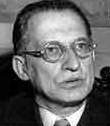
De Gasperi |
De Gasperi, Alcide, original name Alcide Amedeo Francesco Degasperi (b. April 3, 1881, Pieve Tesino, near Trento, Tirol, Austria-Hungary [now in Italy] - d. Aug. 19, 1954, Sella di Valsugana, near Trento, Italy), prime minister of Italy (1945-53). In 1911 he was elected to the Austrian parliament as a deputy for Trento, joining other Italian deputies who sought the annexation of the Trentino by Italy. When the annexation was effected (1919), he became an Italian citizen and was elected deputy to the Italian parliament in 1921 as one of the founders of the Italian Popular Party (PPI), which represented the liberal Christian Democratic tradition. The party was dissolved by the Fascists in 1926, and he was arrested in 1927 and sentenced to four years imprisonment; he was released, after serving 16 months, through Pope Pius XI's intervention. Active in the resistance during World War II, he succeeded in reorganizing the PPI as the Christian Democrat Party. After the fall of the fascist regime (1943), he became secretary of the Christian Democrat Party (DC) and was appointed minister without portfolio in Ivanoe Bonomi's first cabinet (June 9, 1944). Foreign minister in the two succeeding cabinets, he formed his own cabinet on Dec. 10, 1945. He signed the peace treaty with the Allies, had parliament ratify it (September 1947), and then enacted a new constitution (January 1948). Seeking closer ties with the West, Italy entered the North Atlantic Treaty Organization in 1951 and began rearming shortly thereafter. A leading proponent of the formation of a federation of democratic European states, he helped organize the Council of Europe and the European Coal and Steel Community (1951). After the fall of his government in 1953, he became secretary general of the DC, which named him its president in May 1954.
De Geer (af Finspång), Lars (Gustaf Gerard friherre) (b. Sept. 3, 1922, Grangärde, Kopparberg [now Dalarna], Sweden - d. March 20, 2002, Lesjöfors, Värmland, Sweden), defense minister of Sweden (1978-79); great-grandnephew of Louis Gerard friherre De Geer af Finspång.
De Geer af Finspång, Fabian (Otto Gerard) friherre (b. April 28, 1850, Säbylund, Örebro, Sweden - d. April 18, 1934, Stockholm, Sweden), governor of Skaraborg (1906-17); nephew of Louis Gerard friherre De Geer af Finspång.
De Geer af Finspång, Gerard Louis friherre (b. Nov. 27, 1854, Kristianstad, Kristianstad [now in Skåne], Sweden - d. Feb. 25, 1935, Kviinge, Kristianstad [now in Skåne]), governor of Kristianstad (1905-23) and prime minister of Sweden (1920-21); son of Louis Gerard friherre De Geer af Finspång.
De Geer af Finspång, Louis Gerard friherre (b. July 18, 1818, Finspång, Östergötland, Sweden - d. Sept. 24, 1896, Hanaskog, Kristianstad [now in Skåne], Sweden), prime minister for justice (1858-70, 1875-76), prime minister (1876-80), and justice minister (1876-79) of Sweden.
De Geer af Leufsta, Emanuel friherre (b. Sept. 28, 1748, Stockholm, Sweden - d. April 19, 1803, Uppsala, Sweden), chancellery president of Sweden (1786-87). He was also minister to the Netherlands (1775-79).
De Geer af Tervik, Otto Wilhelm friherre (b. Dec. 30, 1710, Godegård socken [now in Motala municipality], Östergötland, Sweden - d. March 24, 1769, Stockholm, Sweden), governor of Savolax och Kymmenegård (1757-65). He was made friherre (baron) in 1766.
De Geer af Tervik, Robert Wilhelm greve (b. July [or June] 15, 1750, Pernå socken, Finland - d. Nov. 4, 1820, Helsingfors [now Helsinki], Finland), governor of Kymmenegård (1783-89); son of Otto Wilhelm friherre De Geer af Tervik. He was raised from friherre (baron) to greve (count) in 1809.

De Gucht | 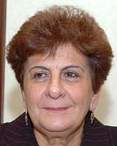
de Jongh-Elhage |
De Gucht, Karel (Lodewijk Georges Emmerance) (b. Jan. 27, 1954, Overmere, Belgium), foreign minister of Belgium (2004-09). He was EU commissioner for development and humanitarian aid (2009-10) and trade (2010-14).
de Jongh-Elhage, Emily (Saïdy) (b. Dec. 7, 1946, Santa Rosa, Curaçao), prime minister and foreign minister of the Netherlands Antilles (2006-10). She was also minister of education, sport, and culture (2002-03).
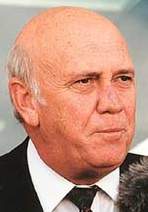
F.W. de Klerk |
de Klerk, Frederik W(illem) (b. March 18, 1936, Johannesburg, South Africa - d. Nov. 11, 2021, Cape Town, South Africa), president of South Africa (1989-94); son of Johannes de Klerk. In 1972 he was elected to parliament for the National Party (NP). He was minister of social welfare and pensions (1978), posts and telecommunications (1978-79), sports and recreation (1978-79), mines, energy and environmental planning (1979-80), mineral and energy affairs (1980-82), internal affairs (1982-85), and national education and planning (1984-89) and chairman of the Ministers' Council of the House of Assembly (1985-89). After Pres. P.W. Botha fell ill in January 1989, de Klerk was elected leader of the NP and successfully opposed Botha's resumption of office after his recovery. He was formally elected president by the tricameral parliament on September 14. He owed his political success to the power base he had built up in the Transvaal, where he had been chairman of the provincial NP from 1982. He committed himself to initiating talks about a new postapartheid constitution with representative leaders of the country's ethnic communities. He quickly moved to release all important political prisoners, including Nelson Mandela (in 1990), and to lift the ban on the African National Congress (ANC) and the Pan-African Congress. Thereafter, he frequently met with black leaders, and in 1991 his government repealed several racially discriminatory laws. In 1992 he called a referendum in which almost 69% of the country's white voters endorsed his reform policies. He and Mandela jointly received the 1993 Nobel Peace Prize for their collaboration in efforts to establish nonracial democracy in South Africa. De Klerk led his party's campaign in the first all-race elections in April 1994, which the ANC won. He subsequently joined a government of national unity formed by Mandela, taking the post of second deputy president. The NP withdrew from the government in 1996, and de Klerk resigned as party leader in 1997.
de Klerk, Johannes, byname Jan de Klerk (b. July 22, 1903, Burgersdorp, Cape Colony [now in Eastern Cape province, South Africa] - d. Jan. 24, 1979, Krugersdorp, Transvaal [now in Gauteng], South Africa), internal affairs minister (1961-66), president of the Senate (1969-76), and acting president (1975) of South Africa. He was also minister of labour (1954-61), public works (1954-58), mines (1958-61), immigration (1961), education, arts, and sciences (1961-67), information (1966-68), and national education (1967-69).
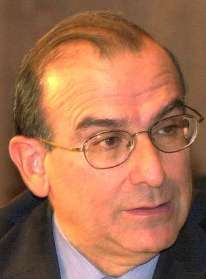
de la Calle |
de la Calle (Lombana), Humberto (b. July 14, 1946, Manzanares, Caldas department, Colombia), Colombian politician. He was interior minister in 1990-93 and was Ernesto Samper's running mate in the 1994 presidential elections. Samper's winning campaign was allegedly bankrolled by more than $6 million in contributions from the notorious Cali drug mob. Unlike other key Samper aides, Vice President de la Calle did not resign when the so-called "narco-scandal" erupted but only quit halfway through the presidential term (1996) saying the "country was falling to pieces." He had also served as ambassador to Spain (1995-96); in 1998-2000 he was ambassador to the United Kingdom. In 2000 he again became interior minister and was a close collaborator in Pres. Andrés Pastrana's efforts to make peace with leftist guerrillas. He resigned in 2001 and was appointed ambassador to the Organization of American States, a post he resigned in 2002. He was a minor presidential candidate in 2018.
de la Fuente (Álvarez), César A(ugusto) (b. June 3, 1877, Lima, Peru - d. July 12, 1962, Lima), foreign minister of Peru (1936-37). He was also minister of war and navy (1917-18) and war (1940-44).
De la Gardie, Adam Carl greve (b. May 4, 1668, Stockholm, Sweden - d. Jan. 1, 1721), governor of Kalmar (1709-21); son of Axel Julius greve de la Gardie.
De la Gardie, Axel (Gabriel) greve (b. Nov. 23, 1772, Stockholm, Sweden - d. Jan. 15, 1838, Sönnarslöv socken, Kristianstad [now in Skåne], Sweden), governor of Kristianstad (1811-38); great-grandson of Axel Julius greve de la Gardie.
De la Gardie, Axel Julius greve (baptized Feb. 12, 1637, Stockholm, Sweden - d. May 17, 1710, Stockholm), governor-general of Estonia (1687-1704).
De la Gardie, Magnus (Gabriel) greve (b. May 17, 1839, Sönnarslöv socken, Kristianstad [now in Skåne], Sweden - d. Jan. 29, 1905, Stockholm, Sweden), governor of Kristianstad (1883-1905); grandson of Axel greve de la Gardie; nephew of Robert greve de la Gardie (1823-1916).
De la Gardie, Robert greve (b. Dec. 17, 1823, Kristianstad, Kristianstad [now in Skåne], Sweden - d. May 19, 1916, Stockholm, Sweden), governor of Östergötland (1867-1901); son of Axel greve de la Gardie. He was also speaker of the Second Chamber of the Riksdag (1894-1902).
De la Gardie, Robert greve (b. Aug. 7, 1858, Iikan socken, Malmöhus [now in Skåne], Sweden - d. Feb. 27, 1937, Stockholm, Sweden), governor of Malmöhus (1909-25); son of the above.
De la Gardie, Ulrik Gustaf greve (b. Nov. 22, 1727 - d. June 19, 1809, Västerås, Västmanland, Sweden), governor of Västmanland (1784-1809); grandson of Axel Julius greve de la Gardie; nephew of Adam Carl greve de la Gardie.
de la Grange, Erik Johan (b. Jan. 27, 1734, Hässleby socken, Jönköping, Sweden - d. Oct. 23, 1807, Eksjö socken, Jönköping), governor of Jönköping (1795-1801).
de la Grange, Johan Georg friherre (b. July 1, 1774 - d. March 26, 1844, Grythyttan socken, Örebro, Sweden), governor of Kalmar (1810-22); son of Erik Johan de la Grange. He became friherre (baron) in 1817.
de la Riva Agüero (y Sánchez Boquete), José (Mariano de la Cruz) (b. May 3, 1783, Lima, Peru - d. May 21, 1858, Lima), president of Peru (1823) and provisional president of the North-Peruvian State (1838-39).
de la Riva-Agüero Riglos, Enrique (Eugenio Manuel) (b. Sept. 6, 1857, Lima, Peru - d. July 10, 1930, Rome, Italy), foreign minister (1896-98, 1899-1900, 1916-17) and prime minister (1899-1900, 1915-17) of Peru; son of José de la Riva-Agüero y Looz Corswarem. He was also minister to Argentina (1907-10) and Spain (1913-15).
de la Riva-Agüero y Looz Corswarem, José (Carlos Fulgencio Pedro Regalado) (b. May 25, 1827, Antwerp, Belgium - d. Aug. 16, 1881, Lima, Peru), finance minister (1872) and foreign minister (1872-75) of Peru; son of José de la Riva Agüero.
de la Riva-Agüero y Osma, José (b. Feb. 26, 1885, Lima, Peru - d. Oct. 25, 1944, Lima), prime minister and minister of justice, education, and worship of Peru (1933-34); nephew of Enrique de la Riva-Agüero Riglos; grandson of José de la Riva-Agüero y Looz Corswarem. He held the Spanish titles of VI marqués de Montealegre de Aulestia and V marqués de Casa Dávila.
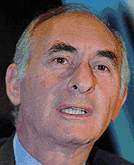
F. de la Rúa |
de la Rúa (Bruno), Fernando (b. Sept. 15, 1937, Córdoba, Argentina - d. July 9, 2019, Escobar, Buenos Aires province, Argentina), president of Argentina (1999-2001). He entered politics at 26 and became a senator at 35, in 1973. In September 1973 he was the vice presidential candidate of the Radical Civic Union. In 1996, he was elected mayor of Buenos Aires, where he turned the capital's $600 million budget deficit into a surplus and installed anti-corruption agencies. In 1999 de la Rúa cast himself as a candidate of change, a dull but steady hand to guide Argentina out of a recession after a decade under the flamboyant Carlos Menem. He made his sedate image an advantage, one campaign ad showing Menem in a Ferrari and de la Rúa saying: "I'm going to end this party." He rode to the presidency at the head of the Alliance coalition, a perpetually shaky union of his centrist Radical party and the leftist Frepaso movement of his vice president, Carlos Álvarez. After a brief honeymoon - his approval rating topping 70% in December 1999 - he soon began to flounder. First came a Senate scandal, with allegations that government officials had bribed lawmakers to pass a key bill. Accusations that de la Rúa was not confronting corruption snowballed, and Álvarez resigned in October 2000, accusing de la Rúa of disregarding a "cancer" of corruption. Meanwhile, the economy failed to pick up, and by March 2001, a desperate de la Rúa fired two economy ministers in two weeks and turned to Menem's former miracle worker, Domingo Cavallo. Cavallo could not muster a repeat performance, and both men's popularity plummeted as the government imposed austerity plans, cutting state salaries and pensions and hiking taxes. The anger boiled over in December, and de la Rúa was driven from office by violent protests. He made one last bid to build a government of "national unity," then wrote out his resignation.
de la Rúa (Bruno), Jorge (Enrique) (b. Sept. 22, 1941, Córdoba, Argentina - d. Aug. 15, 2015, Córdoba), justice minister of Argentina (2000-01); brother of Fernando de la Rúa.
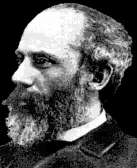
De Leon |
De Leon, Daniel (b. Dec. 14, 1852, Curaçao, Netherlands Antilles - d. May 11, 1914, New York City), U.S. socialist. He was one of the chief propagandists for socialism in the early American labour movement, but his uncompromising tactics were often divisive. De Leon arrived in the U.S. in 1874. He supported Henry George's mayoral campaign in New York City in 1886. In 1890 he joined the Socialist Labor Party (SLP) and soon became one of the leading figures in the party, editing its newspaper The People and helping to transform it into a disciplined national organization. He excoriated the labour union leadership of the day as insufficiently radical and in 1895 led a faction that seceded from the Knights of Labor, subsequently forming the Socialist Trade and Labor Alliance (STLA). In 1899 a dissident faction left the SLP and formed what became the Socialist Party of America. The membership and prestige of the SLP declined thereafter. At a convention in Chicago in 1905, De Leon helped found the Industrial Workers of the World (IWW), with which the STLA promptly merged. But he was refused a seat at the IWW's 1908 convention by extremists who rejected political activity of the sort that he advocated and who favoured more violent tactics. He then created another schismatic body, the "Detroit IWW" (as opposed to the original "Chicago IWW") based on the SLP's program. After De Leon's death it was renamed the Workers' International Industrial Union in 1915 and was dissolved in 1925. In De Leon's philosophy there was no belief that government should nationalize the industries, under the leadership of a supposed working-class party. The goal, rather, was direct democratic control of all industries and services by the workers united in an industrial union.
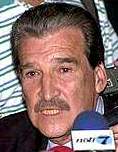
de León Carpio |
de León Carpio, (José) Ramiro (b. Jan. 12, 1942, Guatemala City - d. April 16, 2002, Miami, Fla.), president of Guatemala (1993-96). He was joint president of the National Constituent Assembly (1984-86) and human rights ombudsman (1989-93). He was named president when Jorge Serrano was forced to flee the country after a failed attempt to dismiss Congress and the Supreme Court. In March 2002, he announced he was leaving the ruling Guatemalan Republican Front party because he was concerned about allegations of corruption in government.
De L'Isle, William Philip Sidney, (1st) Viscount (b. May 23, 1909, London, England - d. April 5, 1991, Penshurst, Kent, England), governor-general of Australia (1961-65). He was also British secretary of state for air (1951-55). He succeeded as (6th) Baron De L'Isle and Dudley in 1945 and was created viscount in 1956.
de los Heros (Pérez Albela), Alfonso (b. Jan. 15, 1939), prime minister of Peru (1991-92). He was also minister of labour and social promotion (1991-92).
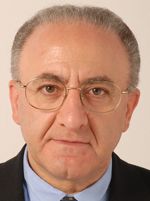
De Luca | 
L. de Maizière |
De Luca, Vincenzo (b. May 8, 1949, Ruvo del Monte, Basilicata, Italy), president of Campania (2015- ). He was also mayor of Salerno (1993, 1993-2001, 2006-15).
de Maizière, Lothar (b. March 2, 1940, Nordhausen, Thüringen, Germany), premier (1990) and foreign minister (1990) of East Germany. He was also a deputy premier of East Germany (1989-90) and minister for special tasks of Germany (1990).
de Maizière, (Karl Ernst) Thomas (b. Jan. 21, 1954, Bonn, West Germany), minister for special tasks (2005-09), interior minister (2009-11, 2013-18), and defense minister (2011-13) of Germany; cousin of Lothar de Maizière.
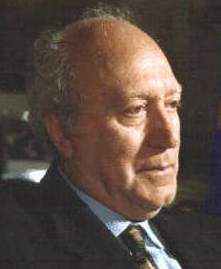
de Marco |
de Marco, Guido (b. July 22, 1931, Valletta, Malta - d. Aug. 12, 2010, Msida, Malta), Maltese politician. He was first elected to the House of Representatives for the Nationalist Party in April 1966 and was returned to parliament at every subsequent election. Appointed secretary general of the Nationalist Party in 1972, he served until 1977 when he was elected deputy leader. When the Nationalist Party was returned to office in 1987, de Marco was appointed deputy prime minister and minister of the interior and justice. During his tenure, de Marco introduced several bills in the House of Representatives that integrated important conventions, such as the European Convention on Human Rights, into domestic law. As interior minister he led the reform and modernization of the Police Force and founded the Police Academy. He was appointed as minister of foreign affairs in May 1990 and remained in office until October 1996. One of his first acts as foreign minister was submitting Malta's application for membership of the European Communities in Brussels on July 16, 1990. On Sept. 18, 1990, de Marco was elected president of the United Nations General Assembly (45th Session). Between 1996 and 1998 de Marco served as shadow minister and opposition spokesman on foreign affairs and as a member of the Parliamentary Committee on Foreign Affairs. He was reappointed deputy prime minister and minister of foreign affairs on Sept. 8, 1998, following the Nationalist Party's victory at the 1998 general elections. On September 11, he presented Malta's request for the reactivation of its application for membership to the European Union to Wolfgang Schüssel, the foreign minister of Austria, which held the presidency of the European Union. De Marco was president of Malta from 1999 to 2004.
de Maré, Johan Gustaf Samuel (b. April 12, 1820, Västervik, Kalmar, Sweden - d. Jan. 3, 1880, Falun, Kopparberg [now Dalarna], Sweden), governor of Kopparberg (1863-80).
De Marsico, Alfredo (b. May 29, 1888, Sala Consilina, Campania, Italy - d. Aug. 8, 1985, Naples, Italy), justice minister of Italy (1943).
De Martino, Francesco (b. May 31, 1907, Naples, Italy - d. Nov. 18, 2002, Naples), Italian politician. He took part in the anti-Fascist resistance in World War II. After the war he joined the reconstituted Socialist Party and was elected to parliament in 1948. He soon won the confidence of party leader Pietro Nenni, to whom he became vice secretary in 1958. When, in 1963, Nenni became deputy prime minister in the first centre-left government of Aldo Moro, De Martino took over as party secretary. He tried unsuccessfully to stop a split by hardline leftists opposed to the Socialists' entry into a coalition government with the Christian Democrats. In 1966-69, the Socialists temporarily united with the Social Democrats; De Martino and Mario Tanassi became joint secretaries. He was deputy prime minister in 1968-69 and 1970-72. For the latter period he ceded the party leadership to Giacomo Mancini. In 1976 he was replaced as leader by Bettino Craxi following the party's poor showing in national elections. In April 1977 his son Guido was kidnapped and then released after 10 days. Shaken by the abduction, De Martino retired from active politics. Under Craxi, the Socialist Party became embroiled in the Clean Hands corruption scandal which shook Italian politics in the early 1990s. Craxi, disgraced, went into exile, and the Socialists, like several other parties tainted by scandal, collapsed. De Martino was given the honour of being named senator-for-life in 1991, at which point he joined the post-Communist Democrats of the Left, whom he considered "the true heirs to socialist values."
De Martino, Giacomo (b. Dec. 8, 1815, Tunis, Tunisia - d. April 6, 1879, Pontedera, Pisa province, Italy), foreign minister of the Two Sicilies (1860).
De Martino, Giacomo (b. Sept. 21, 1849, London, England - d. Nov. 23, 1921, Benghazi, Cyrenaica [now in Libya]), governor of Somalia (1910-16), Eritrea (1916-19), and Cyrenaica (1919-21); son of the above.
De Martino, Giacomo (b. Sept. 7, 1868, Bern, Switzerland - d. June 25, 1957, Rome, Italy), Italian diplomat; grandson of Giacomo De Martino (1815-1879). He was ambassador to Germany (1920), the United Kingdom (1921-22), Japan (1922-25), and the United States (1925-32).
De Michelis, Gianni (b. Nov. 26, 1940, Venice, Italy - d. May 11, 2019, Venice), foreign minister of Italy (1989-92). He was also minister of state participation (1980-83) and labour (1983-87) and deputy prime minister (1988-89).
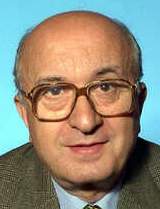
De Mita |
De Mita, (Luigi) Ciriaco (b. Feb. 2, 1928, Nusco, Avellino province, Italy - d. May 26, 2022, Avellino, Italy), prime minister of Italy (1988-89). A Christian Democrat (DC) party councillor from 1956, he became MP in 1963, and served as minister of industry, commerce, and arts and crafts (1973-74), foreign trade (1974-76), and for the Mezzogiorno (1976, 1978-79). He became party chairman in 1982 and was reelected in 1986 with the backing of 60% of the party conference. When he took over the party leadership, it seemed as if the DC political amalgamation was coming unstuck after 33 years in power. Candidates chosen by De Mita as possible prime ministers had failed to persuade the other parties to join the DC in another coalition, and Pres. Sandro Pertini asked the Republican leader, Giovanni Spadolini, to try his luck. The result was that in June 1981 the DC party for the first time joined a coalition that was not headed by one of its own men. After 17 months Spadolini was replaced by Amintore Fanfani, a Christian Democrat, but 8 months later another "outsider," Socialist leader Bettino Craxi, representing a party one-third the size of De Mita's, was chosen as prime minister. Craxi held onto the post for nearly four years. Those years allowed Craxi to enhance his personal power and that of his party; to De Mita's regret. Even following the 1987 elections, De Mita eschewed the premiership for eight months while his protégé, Giovanni Goria, was prime minister. In April 1988 De Mita was finally sworn in as prime minister. His refusal to give up chairmanship of the party at the same time caused irritation among those wanting to step into his shoes.
De Nava, Giuseppe (b. Sept. 23, 1858, Reggio Calabria, Two Sicilies [now in Italy] - d. Feb. 27, 1924, Rome, Italy), finance minister (1920) and treasury minister (1921-22) of Italy. He was also minister of industry, commerce, and labour (1916-17), maritime and rail transport (1919, 1920), public works (1920), and industry and commerce (1920).
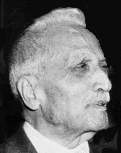
De Nicola |
De Nicola, Enrico (b. Nov. 9, 1877, Naples, Italy - d. Oct. 1, 1959, Torre del Greco, near Naples), president of Italy (1946-48). He was also speaker of the Chamber of Deputies (1920-24) and Senate (1951-52) and chairman of the Constitutional Court (1956-57).
De Pietro, Michele (b. Feb. 26, 1884, Cursi, Puglia, Italy - d. Oct. 7, 1967, Lecce, Puglia), justice minister of Italy (1954-55).
De Ruyt, Jean (b. Sept. 14, 1947, Louvain, Belgium), Belgian diplomat. He was ambassador to Poland (1994-96) and Italy (2004-07) and permanent representative to the United Nations (2001-04).
De Sanctis, Francesco (b. March 28, 1817, Morra Irpina, Two Sicilies [now in Italy] - d. Dec. 29, 1883, Naples, Italy), Italian politician. Also known as a literary critic, he was minister of education (1861-62, 1878, 1879-81).
de Saram, John, Sri Lankan diplomat. He was permanent representative to the United Nations (1998-2002).
de Silva, H(erman) L(eonard) (b. Jan. 28, 1928 - d. April 8, 2009), Sri Lankan diplomat. He was permanent representative to the United Nations (1995-98).
De Sola, René (b. Sept. 10, 1919, Caracas, Venezuela - d. Jan. 19, 2018), foreign minister of Venezuela (1958-59). He was also justice minister (1958) and president of the Supreme Court of Justice (1987-89).
De Sutter, Petra, originally Paul De Sutter (b. June 10, 1963, Oudenaarde, Belgium), Belgian politician. As a deputy prime minister and minister of civil service and public enterprises (2020- ), she is probably the world's highest-ranking transgender politician, having transitioned in 2004.
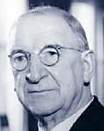
E. de Valera |
de Valera, Eamon, original name Edward de Valera (b. Oct. 14, 1882, New York City - d. Aug. 29, 1975, Dublin, Ireland), prime minister (1932-48, 1951-54, 1957-59) and president (1959-73) of Ireland. He participated in the anti-British Easter Rising in Dublin (1916). Because of his American birth, he escaped execution by the British but was sentenced to penal servitude. He was elected president of the revolutionist Sinn Féin party, which won three-quarters of all the Irish constituencies in December 1918. The Irish members of the House of Commons met as the Dáil Éireann (Irish Assembly) and declared for a republic with de Valera as president. After a dramatic escape from Lincoln Jail in February 1919, he went in disguise to the U.S., where he collected funds. He returned to Ireland in 1921 and appointed plenipotentiaries to negotiate in London. He repudiated the treaty that they signed to form the Irish Free State, however, because it accepted the exclusion of Northern Ireland and imposed an oath of allegiance to the British crown. When the Dáil ratified the treaty (Jan. 8, 1922), de Valera resigned the presidency and supported the republican resistance in the ensuing civil war. William Thomas Cosgrave's Irish Free State ministry imprisoned him; but he was released in 1924 and then organized a Republican opposition party, Fianna Fáil. The Cosgrave ministry was defeated by Fianna Fáil in 1932, and de Valera embarked quickly on severing connections with Great Britain. In 1937 the Free State declared itself a sovereign state, as Ireland, or Éire. In 1959 de Valera agreed to stand as a candidate for the presidency. He resigned his position as taoiseach (head of government) and leader of Fianna Fáil. In June he was elected president and he was reelected in 1966.
de Valera, Síle (b. Dec. 17, 1954, Dublin, Ireland), Irish minister of arts, heritage, Gaeltacht and the islands (1997-2002); granddaughter of Eamon de Valera and cousin of Éamon Ó Cuív.
De Vecchi, Cesare Maria, (from 1925) conte di Val Cismon (b. Nov. 14, 1884, Casale Monferrato, Alessandria province, Italy - d. June 23, 1959, Rome, Italy), governor of Somalia (1923-28) and the Dodecanese Islands (1936-40). He was also Italian ambassador to the Vatican (1929-35) and education minister (1935-36).
De Vido, Julio (Miguel) (b. Dec. 26, 1949, Buenos Aires, Argentina), Argentine minister of federal planning, public investments and services (2003-15).
De-Vollan, Grigory (Aleksandrovich) (b. March 4 [Feb. 20, O.S.], 1847, St. Petersburg, Russia - d. May 11 [April 28, O.S.], 1916, Yalta, Russia), Russian diplomat; grandson of Frants Devollan. He was chargé d'affaires (1902-06) and minister (1906-10) to Mexico.
de Wet, Jan, byname of Johannes Marthinus de Wet (b. Nov. 10, 1927, Rouxville, South Africa - d. Feb. 13, 2011, Windhoek, Namibia), chairman of the Transitional Government of National Unity of Namibia (1987-88).
de Zoysa, Stanley (b. June 24, 1907 - d. Dec. 10, 1970), finance minister of Ceylon (1956-59). He was also minister of home affairs and health (1959-60).
Deák, Ferenc, byname a haza bölcse ("Sage of the Country") (b. Oct. 17, 1803, Söjtör, Austria [now in Hungary] - d. Jan. 28/29, 1876, Budapest, Hungary), Hungarian politician. He entered the Hungarian Diet in 1833 and played a moderate liberal role, dissociating himself from Lajos Kossuth's extreme-Magyar nationalism. Reelected in 1843, he declined his mandate in protest against the scandalous manner in which the election had been conducted. By this time he had become the most generally respected figure in his camp. He drafted for the "national opposition" its program of reform for the Diet of 1847. Ill health prevented him from seeking election to that body, but when, in March 1848, the crown sanctioned the establishment of an independent Hungarian ministry, the new minister-president, Lajos Batthyány, insisted on his taking the portfolio of justice. During the next months, he took part in most of the negotiations between the Hungarian government and its opponents. He ceased to be minister when Batthyány resigned in September, and he refused reappointment. Prevented from rejoining the Diet, he retired for some years, refusing all invitations to collaborate with a regime that he condemned as illegal. From 1854 he became the oracle of all those who sought a way out of Hungary's political impasse. In 1861 he returned to the Diet as head of the moderate opposition. As his international difficulties gradually convinced Emperor Franz Joseph of the need for reconciliation with Hungary, Deák put forward Hungary's conditions in terms that led to the Compromise (Ausgleich) of 1867, by which the dual monarchy of Austria-Hungary was established. Deák was beyond question the originator of the Compromise, though its machinery was not all of his devising. He helped to complete the legislation deriving from the Compromise and defended it in parliament when necessary. The Compromise was the crowning achievement of Deák's life work, but he also exercised his influence in many other areas of public life, always on the side of reasoned reform.
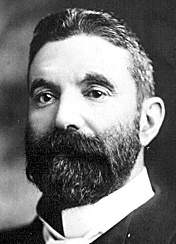
Deakin |
Deakin, Alfred (b. Aug. 3, 1856, Melbourne, Victoria [Australia] - d. Oct. 7, 1919, Melbourne), prime minister (1903-04, 1905-08, 1909-10) and foreign minister (1903-04, 1905-08) of Australia. In 1880 he entered the Legislative Assembly of Victoria, where he served until 1901. In 1883 he became minister of public works in the Victoria government, and afterwards solicitor general and minister for water supply. He sponsored an important irrigation bill in 1886 and acts protecting factory workers in 1885 and 1896. A leader in the federation movement, he attended the conferences of 1891 and 1897-98 that drafted the constitution bill making Australia a commonwealth. He then went to England in 1900 to guide the bill through parliament. He was elected to the federal parliament in 1901 and was its most interesting personality until he retired in 1913. As attorney general under Sir Edmund Barton (1901-03) he was responsible for many opinions which defined the limits of federal and state authority. When Barton went to the High Court, Deakin was his natural successor. A leader of the Liberal Party, he formed a coalition with the Labor Party in his first two terms but joined with the conservatives in his third term, an unpopular move that quickly led to electoral defeat. He retained the leadership of the Liberal Party, but his political acumen and his mental powers began to decline in December 1912. On Jan. 8, 1913, he retired from active participation in politics, giving his reason as "inability to remember things," and when the parliament was dissolved he did not seek reelection. His plans for an independent Australian navy were carried out by his successors.

H. Dean |
Dean, Howard (Brush, III) (b. Nov. 17, 1948, New York City), governor of Vermont (1991-2003). The Democrat was elected to the state legislature in 1982 and as lieutenant governor in 1986; when Republican Gov. Richard Snelling died suddenly in August 1991, Dean became governor. Dean is proud of family leave legislation, a bill to reduce phosphorus in lakes and streams and a $14 million small business fund. But his chief issue has been health care. In 1992, he signed a bill to move Vermont toward universal healthcare access; a state agency was set up to bargain with insurance companies. Vermont seemed like a promising laboratory on the healthcare issue. It has only 15 hospitals, 1,000 practicing doctors, rather low costs, two major health insurers: a comprehensible universe. In 1993 Dean produced a Clinton-like state healthcare system, but it was harshly rejected, defeated in the state Senate in May 1994 by, in Dean's words, "an unholy alliance of the far left and the far right." That foreshadowed the crash-and-burn of the Clinton plan. Dean was similarly frustrated in late 1994 and early 1995. He opposed much of the GOP's plans for block grants to states. As head of the National Governors Association, he saw his liberal views ignored by the new Republican congressional leaders, who focused on the 30 Republican governors representing 73% of the electorate nationwide. Vermont and New Hampshire, so unlike politically, are the last states to cling to a two-year gubernatorial term. Dean was reelected with 75% in 1992, 69% in 1994, 71% in 1996, 56% in 1998, and 51% in 2000. He was one of the contenders for the 2004 Democratic presidential nomination. In 2005-09 he was chairman of the Democratic National Committee.
Dean, Sir Patrick (Henry) (b. March 16, 1909, Berlin, Germany - d. Nov. 5, 1994, Kingston, Surrey, England), British diplomat; knighted 1957. He was permanent representative to the United Nations (1960-64) and ambassador to the United States (1965-69).
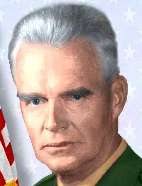
W.F. Dean |
Dean, William F(rishe) (b. Aug. 1, 1899, Carlyle, Ill. - d. Aug. 25, 1981, Berkeley, Calif.), U.S. military governor of South Korea (1947-48).
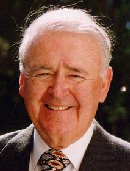
Deane |
Deane, Sir William (Patrick) (b. Jan. 4, 1931, Melbourne, Vic.), governor-general of Australia (1996-2001). He worked for a period in the Commonwealth Attorney-General's Department in Canberra. In February 1977 Sir William was appointed a judge in the Equity Division of the Supreme Court of New South Wales. Subsequently in 1977, he was appointed a judge of the Federal Court of Australia and the President of the Australian Trade Practices Tribunal. In July 1982, he was appointed a Justice of the High Court of Australia, retiring subsequent to the announcement of his appointment as governor-general on Nov. 10, 1995. He was appointed a Knight of the British Empire in 1982 and a Companion in the Order of Australia in 1988. Sir William was sworn in as governor-general on Feb. 16, 1996.
Dearborn, Henry (b. Feb. 23, 1751, North Hampton, New Hampshire - d. June 6, 1829, Roxbury, Mass.), U.S. secretary of war (1801-09) and senior officer of the Army (1812-15). He was also minister to Portugal (1822-24).
Déat, Marcel (b. March 7, 1894, Guérigny, Nièvre, France - d. Jan. 5, 1955, Turin, Italy), French politician. He was minister of air (1936) and labour and national solidarity (1944).
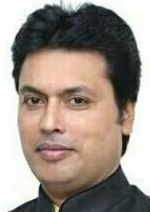
B.K. Deb |
Deb, Biplab Kumar (b. Nov. 25, 1969, Rajdhar Nagar village [now in Gomati district], Tripura, India), chief minister of Tripura (2018-22).

D. Deb |
Deb, Dasarath (b. Feb. 2, 1916, Boltali village, Khowai subdivision, West Tripura, India - d. Oct. 14, 1998, Agartala, Tripura), Indian politician. His political career began with a mass literacy movement intended for the uplift of the tribal people in Tripura. He led an armed struggle for three years (1948-50) against the repressive, feudal rule of the king of Tripura. In 1950 he joined the Communist Party of India (CPI). He was inducted into the Central Committee of the CPI in 1951. Immediately he made his presence felt in the party at the national level. When the CPI split in 1964, he joined the CPI(M) and was its Central Committee member until the party's 16th congress in Calcutta, held in October 1998. He filed his nomination for the first Lok Sabha elections in 1952 while remaining underground. He won the East Tripura seat with a huge margin on the CPI ticket even without any organized campaign. Deb served as a member of parliament for four terms - from 1952, 1957, 1962, and 1971. Deb did not lose any election except one to the Lok Sabha in 1967. He began to concentrate more on state politics in 1978 and fought the Assembly elections from his home comstituency, Ramchandraghat in West Tripura. He was elected to the State Assembly for four consecutive terms between 1978 and 1993. He was education minister in the first Left Front Government in Tripura in 1978 and deputy chief minister in the second one in 1983. The Left Front went out of power in the 1988 elections, but the high point came for Deb in 1993 when as the state secretary of the CPI(M) he led the party again to victory. Deb took over as chief minister of a Left Front government, and continued in that position until early 1998. He declined on health grounds to contest the 1998 Assembly elections.

Debacq | 
Debbas |
Debacq, Jean-Jacques (b. Nov. 2, 1952, Nantes, Loire-Inférieure [now Loire-Atlantique], France), prefect of Mayotte (1993-94). He was also prefect of the départements of Orne (1999-2001) and Pyrénées-Orientales (2001-02).
Debayle (Sacasa), León (b. 1902, León, Nicaragua - d. Dec. 28, 1971), foreign minister (1947) and finance minister (1949-50) of Nicaragua; brother of Luis Manuel Debayle. He was also minister (1937-43) and ambassador (1943) to the United States.
Debayle (Sacasa), Luis Manuel (b. May 24, 1894, León, Nicaragua - d. June 3, 1983, Dade county, Fla.), foreign minister of Nicaragua (1936-37, 1948-49). He was also chargé d'affaires in the United States (1932-33).
Debbas, Charles, Arabic Sharl Dabbas (b. April 16, 1884, Beirut, Lebanon - d. 1935, Paris, France), governor (1926), president (1926-34), and prime minister (1932-34) of Lebanon.
Debré, Bernard (b. Sept. 30, 1944, Toulouse, France - d. Sept. 13, 2020), cooperation minister of France (1994-95); fraternal twin of Jean-Louis Debré; son of Michel Debré.
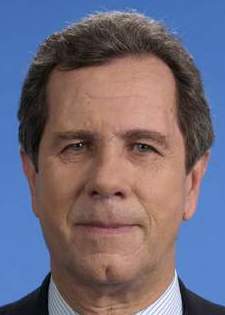
J.-L. Debré |
Debré, Jean-Louis (b. Sept. 30, 1944, Toulouse, France), interior minister (1995-97), president of the National Assembly (2002-07), and president of the Constitutional Council (2007-16) of France; son of Michel Debré.

M. Debré |
Debré, Michel (Jean Pierre) (b. Jan. 15, 1912, Paris, France - d. Aug. 2, 1996, Montlouis-sur-Loire, Indre-et-Loire), prime minister of France (1959-62). He entered the civil service, in which he advanced steadily. By the time France declared war on Germany in 1939, he had joined the army as a cavalry officer. Captured and imprisoned by the Germans in 1940, he escaped and joined the Résistance. In 1945, in Charles de Gaulle's provisional government, he was entrusted with planning public administration reforms. He was elected to the Senate in 1948 as a member of de Gaulle's Rassemblement du Peuple Français and was reelected as a Social Republican (the party's new name) in 1955. With de Gaulle's accession as premier in June 1958, Debré became justice minister and the principal author of the new constitution that inaugurated the Fifth Republic. When de Gaulle assumed the presidency in January 1959, Debré was named premier. Although he sympathized with French settlers who opposed "giving up" Algeria, he loyally supported de Gaulle's policy of disengagement. His previous commitments to a French Algeria, however, created increasing embarrassment, and in April 1962 he was replaced by Georges Pompidou. Elected to the assembly in May 1963, he returned to the government in January 1966 as minister of economy and finance. He became foreign minister in May 1968 and in June 1969 moved to the Defense Ministry under Pompidou's presidency, where he remained until 1973. In 1976 he was a leader in the Rassemblement pour la République (RPR), the newly reorganized Gaullist movement founded by Jacques Chirac. He made a bid for the presidency in 1981, running against RPR candidate Chirac as an orthodox Gaullist and winning barely 1% of the votes. He was elected to the Académie française in 1988.
Debrot, Isaac (b. Nov. 7, 1771, Rochefort, Neuchâtel, Switzerland - d. 18...), commander of Bonaire (1817-27).

N. Debrot | 
deBrum |
Debrot, Nicolaas, byname Cola Debrot (b. May 4, 1902, Kralendijk, Bonaire island, Netherlands Antilles - d. Dec. 2, 1981, Amsterdam, Netherlands), chairman of the College of General Administration (1950-51) and governor (1962-70) of the Netherlands Antilles.
deBrum, Tony (Anton) (b. Feb. 26, 1945, Gilbert and Ellice Islands [in present Tuvalu] - d. Aug. 22, 2017, Majuro, Marshall Islands), foreign minister (1979-87, 2008-09, 2014-16) and finance minister (1998-2000) of the Marshall Islands. He was also minister in assistance to the president (2012-14).

Debs |
Debs, Eugene V(ictor) (b. Nov. 5, 1855, Terre Haute, Ind. - d. Oct. 20, 1926, Elmhurst, Ill.), U.S. politician. He was a Democratic state representative in Indiana in 1885-87. In 1893 he became president of the newly established American Railway Union, which won national prominence when it conducted a successful strike against the Great Northern Railroad (April 1894) for higher wages. He was further projected into the limelight when sentenced to six months in jail (May-November 1895) after a federal injunction halted the Chicago Pullman Palace Car Company strike, which he was helping to direct. During his prison term at Woodstock, Ill., he was deeply influenced by his broad reading and became increasingly critical of capitalism. Sympathetic toward Populist doctrines, he campaigned for the Democratic-Populist presidential candidate William Jennings Bryan in 1896. The following year he announced his conversion to socialism and in 1898 led in establishing the Socialist Party of America, though the name was not adopted until 1901. He was the party's presidential candidate for the first time in 1900 but polled only 96,000 votes, a total he raised to 400,000 in 1904. In 1905 he helped found the Industrial Workers of the World (IWW), but he soon withdrew because of its radicalism. He was again the Socialist candidate for president in 1908 and 1912 but refused the nomination in 1916. His highest popular vote (about 915,000) was cast in 1920 - even though he was then in prison for criticizing the government's prosecution of persons charged with sedition in violation of the 1917 Espionage Act. He was released from prison by presidential order in 1921. His citizenship, which he lost when he was convicted of sedition in 1918, was restored posthumously in 1976.
Debski, Aleksander (b. June 13, 1890, Radom, Poland - d. [executed] Jan. 31, 1942, Poznan, Poland), governor of Wolynskie województwo (1925-26).
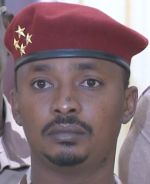
M.I. Déby |
Déby (Itno), Mahamat Idriss, byname Kaka (b. April 4, 1984, N'Djamena, Chad), chairman of the Transitional Military Council (2021-22) and transitional president (2022- ) of Chad; son of Idriss Déby Itno.
Déby (Itno), Zakaria Idriss, Chadian diplomat; son of Idriss Déby Itno. He has been ambassador to the United Arab Emirates (2018- ).
Déby Itno, Daoussa (Idriss), Chadian diplomat; son of Idriss Déby Itno. He was appointed ambassador to Qatar in 2023.
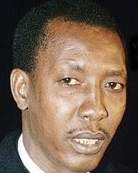
I. Déby Itno |
Déby Itno, Idriss, before 2006 known as Idriss Déby (b. 1952, Berdoba, Borkou-Ennedi-Tibesti, Chad - d. April 20, 2021, northern Chad), president of Chad (1990-2021). He joined the army at the age of 20, later training as a pilot in France. He returned to Chad in 1978 and supported Hissène Habré's opposition to Pres. Goukouni Oueddei, helping orchestrate a coup that brought Habré to power in 1982. Déby then became commander-in-chief of the armed forces. In this capacity, and assisted by French troops, he engaged Libyan forces contesting the mineral-rich Aozou Strip to the north. Déby enjoyed such success that the Libyans sued for peace, which garnered him the nickname "Cowboy of the Desert." In 1985 Habré, who had begun to fear Déby as a potential rival, replaced him as chief of staff, named him military adviser, and sent him back to France for advanced military training. Habré also instituted a period of harsh suppression of internal dissent, which included arbitrary arrests and executions. After being implicated in an unsuccessful revolt against Habré in April 1989, Déby fled the country. From a base in Sudan, he made repeated incursions into Chad and finally ousted Habré in December 1990, leading the Patriotic Salvation Movement (MPS), a coalition of anti-government forces. He made himself interim head of state and promised an eventual return to civilian rule. He survived several coup attempts in 1992. In 1994 he signed a treaty of friendship with Col. Muammar al-Qaddafi of Libya. He was elected president in 1996 under a new multiparty constitution, based on the French dual-executive model. He was reelected in 2001 and, after a 2005 referendum eliminated term limits, in 2006, 2011, 2016, and 2021, continuing to rule Chad with an iron hand as the 1996 constitution placed power almost exclusively in the hands of the executive branch; opposition forces were harassed and imprisoned without warning, while the freedom of the press was also under severe restraint. In 2016-17 he was chairman of the African Union. Just after his last reelection he died while visiting troops on the front line of a fight against northern rebels.
Decazes, Élie (Louis), duc (b. Sept. 28, 1780, Saint-Martin-de-Laye [now in Gironde département], France - d. Oct. 24, 1860, Paris, France), interior minister (1818-20) and prime minister (1819-20) of France. He was also police minister (1815-18) and ambassador to the United Kingdom (1820-21). He was made comte (count) in 1815 and duc (duke) in 1820 (also hertug [duke] af Glücksbierg by the king of Denmark in 1818).
Decazes, Eugène (Louis Frédéric) (b. Jan. 31, 1844, Porto Alegre, Brazil - d. July 12, 1913, Paris, France), commissioner of Haut-Oubangui (1894) and resident of Grande Comore (1896-97).
Decazes, Louis (Charles Élie Amanieu), duc, duc de Glücksberg (b. May 29, 1819, Paris, France - d. Sept. 16, 1886, Bourg, Gironde, France), foreign minister of France (1873-77); son of Élie, duc Decazes. He was also minister to Spain (1846-47) and Portugal (1847-48) and ambassador to the United Kingdom (1873).
Dechamps, Adolphe (Joseph) (b. June 17, 1807, Melle, France [now in Belgium] - d. July 19, 1875, Manage, Belgium), foreign minister of Belgium (1845-47). He was also governor of Luxembourg province (1842-43) and minister of public works (1843-45).
Decharte, Maurice Xavier Joseph (b. Feb. 17, 1882 - d. Aug. 6, 1939), governor of Martinique (1938-39).
Decibe, Susana (Beatriz) (b. Aug. 7, 1948, Bragado, Buenos Aires province), education minister of Argentina (1996-99).
Decoppet, Camille (b. June 4, 1862, Suscévaz, Vaud, Switzerland - d. Jan. 14, 1925, Bern, Switzerland), president of Switzerland (1916). He was also president of the National Council (1906-07), president of the Liberal-Democratic Party (1911-12), minister of interior (1912), justice and police (1913), and military (1914-19), and director of the Universal Postal Union (1920-25).
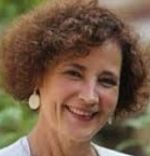
Decorps |
Decorps, Evelyne (b. June 14, 1957), administrator-superior of the French Southern and Antarctic Lands (2018-20). She was also French ambassador to Chad (2013-16) and Mali (2016-18).
Decoud (Domecq), José Segundo (b. May 14, 1848, Asunción, Paraguay - d. [suicide] March 4, 1909, Asunción), foreign minister of Paraguay (1880-86, 1887-88, 1895-1900). He was also minister to Uruguay and Brazil (1892-94).
Decoux, Jean (b. May 5, 1884, Bordeaux, France - d. Oct. 20, 1963, Paris, France), governor-general of French Indochina (1940-45). The Vichy government also named him high commissioner in the Pacific Ocean in December 1941.
Decrais, Albert (Pierre Louis) (b. Dec. 18, 1838, Bordeaux, Gironde, France - d. Feb. 27, 1915, Mérignac, Gironde), French politician. He was prefect of the départements of Indre-et-Loire (1871-74), Alpes-Maritimes (1874-76), and Gironde (1876-77, 1877-79), minister to Belgium (1880-82), ambassador to Italy (1882-86), Austria-Hungary (1886-93), and the United Kingdom (1893-94), and minister of colonies (1899-1902).
Décsi, Gyula, original surname Damweber (b. Jan. 28, 1919, Szentgotthárd, Hungary - d. Sept. 8, 1990, Budapest, Hungary), justice minister of Hungary (1952-53).
Deddach, Mahfoudh Ould (b. 1954, Bassikounou, Mauritania - d. Dec. 15, 2016), Mauritanian politician. He was minister of rural development and environment (1992-93), ambassador to Senegal (1993-96), and permanent representative to the United Nations (1997-2004).
Dedic, Semsudin (b. Oct. 5, 1973, Bihac [now in Federation of Bosnia and Herzegovina]), premier of Una-Sana (2007-11).
Dedman, John (Johnstone) (b. June 2, 1896, Knowe, Kirkcudbrightshire, Scotland - d. Nov. 22, 1973, Canberra, A.C.T.), defence minister of Australia (1946-49). He was also minister of war organisation of industry (1941-45), postwar reconstruction (1945-49), trade and customs (1946), munitions (1946), and aircraft production (1946).
Deeke, Udo (b. Dec. 29, 1905, Blumenau, Santa Catarina, Brazil - d. Sept. 23, 1985, Blumenau), federal interventor in Santa Catarina (1946-47).
Deen, Mohamed Waheed (b. March 3, 1947, Male, Maldives), vice president of Maldives (2012-13). He was also minister of atolls development (2005-07) and youth and sports (2007-08).
Defawe, Oscar (b. Dec. 2, 1891, Ougrée, Liège province, Belgium - d. Nov. 17, 1952, Elisabethville, Belgian Congo [now Lubumbashi, Congo (Kinshasa)]), acting resident of Urundi (1928-29). He was deputy resident from April 10, 1925, to May 12, 1929.
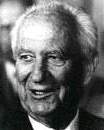
Defferre |
Defferre, Gaston (Paul Charles) (b. Sept. 14, 1910, Marsillargues, Hérault, France - d. May 7, 1986, Marseille, France), French politician. At the age of 23 he joined the Socialist Party. A member of the Executive Committee of the banned party under the German occupation, he was entrusted with missions to London and Algiers. He organized three resistance networks and published a clandestine paper, L'Espoir. After the Liberation, he became mayor of Marseille (1944-45 and 1953-86) and from then on enjoyed a busy political career. He was a deputy to the National Assembly for Marseille almost continuously from 1945 until his death. Under the Fourth Republic, he was in government as minister for the merchant navy and minister of overseas territories. He attracted attention as an opponent of the government's Algerian policy and resigned his ministerial post in 1957. After Gen. Charles de Gaulle came to power in the following year, he lost his parliamentary seat until 1962, when he began to rally the Socialist opposition to de Gaulle's presidency. He was hostile, however, to the Communist Party, the other main element on the left. Standing as the Socialist presidential candidate in 1969, he received only 5% of the vote, in part because of his rivalry with other Socialist figures. A combative politician, he fought a fencing duel with a Gaullist deputy in 1967. After François Mitterrand became president in May 1981, Defferre became minister of the interior and decentralization. His most formidable power base was still in the town hall of Marseille, where for 33 years he managed to hold off the challenge from the right (including the National Front), built up the city's social and cultural amenities, and overcame problems of finance, housing, and an influx of emigrants from Algeria in 1962.
Défly, Serge (Léon) (b. 1898 - d. ...), foreign minister of Haiti (1942-43). He was also ambassador to the Vatican (1956-57).
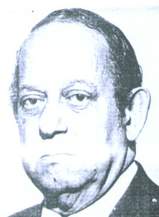
Degazon | 
Degos |
Degazon, Fred(erick Eutrope) (b. Jan. 4, 1913, Castries, St. Lucia - d. Oct. 4, 2008, London, England), president of Dominica (1979-80). He was speaker of the House of Assembly in 1977-78. He left the island in June 1979 and resigned as president in January 1980, remaining in exile in London.
Dègla, Benoît Assouan (Comlan), interior minister of Benin (2011-13).
Degos, Thomas (Marie François) (b. Dec. 28, 1971, Neuilly-sur-Seine, Hauts-de-Seine, France), prefect of Mayotte (2011-13). He was also prefect of Morbihan département (2015-16).
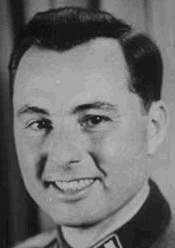
Degrelle |
Degrelle, Léon (Joseph Marie Ignace) (b. June 15, 1906, Bouillon, Belgium - d. March 31, 1994, Málaga, Spain), Belgian politician. Using banking scandals and the corruption of national parties as issues, he organized the Rexist Movement in 1930, allegedly to cleanse the Roman Catholic religion of political contamination. Though originally a wing of the ruling Catholic Party, the Rexist Movement became an opposition party and, under Degrelle's guidance, won more than 10% of the vote and 21 of the 202 seats in the Belgian parliament in the 1936 election. Subsidized by the Italian dictator Benito Mussolini, Degrelle turned the Rexists into a fascist organization. In alliance with the 16 deputies of the separatist Flemish Nationalist Party, the Rexists forced the formation of weak coalition governments in the late 1930s. During World War II Degrelle collaborated with the German occupation forces. In August 1941 he formed and later commanded the Walloon and Flemish storm-trooper brigades that fought on the Russian front. He won the Iron Cross and was decorated by Adolf Hitler personally. Under his guidance the Rexists took control of local governments and newspapers in Belgium. After Belgium was liberated (September 1944) he was sentenced in absentia to death as a collaborator. Degrelle flew to Spain in the last days of the war after fighting the Soviet advance into eastern Germany. In Spain he was protected by Francisco Franco and in 1954 became a Spanish citizen under the name León José de Ramírez Reina.
Degtyar, Dmitry (Danilovich) (b. 1904 - d. 1982, Moscow, Russian S.F.S.R.), Soviet politician. He was chairman of the State Planning Committee (1939-47) and a deputy premier (1940-47) of the Russian S.F.S.R. and Soviet ambassador to Guinea (1962-64).
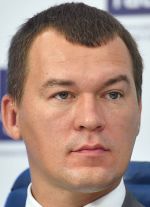
Degtyarev | 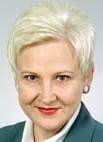
Degutiene |
Degtyarev, Mikhail (Vladimirovich) (b. July 10, 1981, Kuybyshev, Russian S.F.S.R. [now Samara, Russia]), governor of Khabarovsk kray (2020- ).
Degutiene, Irena, née Sabutyte (b. June 1, 1949, Siauliai, Lithuanian S.S.R.), acting prime minister of Lithuania (1999). She was minister of social security and labour (1996-2000) and speaker of the Seimas (2009-12).
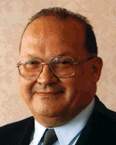
Dehaene |
Dehaene, Jean-Luc(-Joseph-Marie) (b. Aug. 7, 1940, Montpellier, France - d. May 15, 2014, Quimper, France), prime minister of Belgium (1992-99). He held various governmental advisory positions before serving as minister of social affairs and institutional reforms in 1981-88. In the latter year, he became deputy prime minister after engineering a new coalition that retained Wilfried Martens at its helm. Concurrently, Dehaene directed the Ministry of Communications and Institutional Reforms until 1992. General elections on Nov. 24, 1991, prompted by the collapse of the four-party government headed by Martens, reduced the representation of the coalition parties without producing a clear alternative. Guy Verhofstadt, whose opposition Flemish Liberal Party showed the only gains in the parliament, failed to establish a government, as did Melchior Wathelet of the French Christian Democrats. Finally, on March 7, 1992, Dehaene, like Martens a Flemish Christian Democrat, was sworn in as prime minister. Dehaene was an aggressive pragmatist on the political playing field, as attested by his nickname, "the Bulldozer." The entrenched factionalism he faced upon accepting King Baudouin's request to seek a coalition had led some observers to consider Belgium ungovernable. Constitutional reforms whereby the French and Flemish linguistic areas, along with Brussels, would acquire regional autonomy had been inaugurated in 1988 but remained controversial. His primary goal was to secure a two-thirds majority in the 212-seat Chamber of Representatives in order to ensure that the federalization process continued. His coalition consisted, as before, of the two Christian Democrat and the two Socialist parties and was confirmed in elections in 1995. He was a vice-chairman of the European Convention of 2002-03, which drafted a European constitution.
Deheza (Leiva), José Alberto (b. June 16, 1921, Salta, Argentina - d. Sept. 10, 2001, Buenos Aires, Argentina), justice minister (1976) and defense minister (1976) of Argentina.
Dehghani, Gholamhossein (b. 1961, Azna, Iran), Iranian diplomat. He was chargé d'affaires at the United Nations (2014-15).
Dehler, Thomas (b. Dec. 14, 1897, Lichtenfels, Bayern, Germany - d. July 21, 1967, Streitberg, Bayern, West Germany), justice minister of West Germany (1949-53). He was also chairman of the Free Democratic Party (1954-57).
Dehnkamp, Willy (Hans Walter) (b. July 22, 1903, Hamburg, Germany - d. Nov. 12, 1985, Bremen, West Germany), mayor of Bremen (1965-67).
Dehousse, Fernand (b. July 3, 1906, Liége [now Liège], Belgium - d. Aug. 11, 1976, Liège), Belgian politician. He was minister of education (1965-66) and relations between the Flemish-speaking and French-speaking communities (1971-72).
Dehousse, Jean-Maurice (b. Oct. 11, 1936, Liége [now Liège], Belgium - d. Feb. 9, 2023), chairman of the Executive of Wallonia (1982-85); son of Fernand Dehousse. He was also Belgian minister of Francophone culture (1977-79), Walloon affairs (1979-81), and scientific policy (1992-95) and mayor of Liège (1995-99).
Deich, Boris (Davydovych) (b. Aug. 23, 1938 - d. Feb. 7, 2022, Moscow, Russia), chairman of parliament of the Crimea (2002-06).
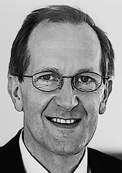
Deiss |
Deiss, Joseph (b. Jan. 18, 1946, Fribourg, Switzerland), foreign minister (1999-2002), economy minister (2003-06), and president (2004) of Switzerland and president of the UN General Assembly (2010-11).
Deitte, Adolphe (b. Jan. 29, 1879, Neuvy-Sautour, Yonne, France - d. June 2, 1949, Nice, Alpes-Maritimes, France), lieutenant governor of Oubangui-Chari (1930-35) and Mauritania (1934) and governor of Ivory Coast (1935-36).
Deiye, Margo (Reminisse), née Clodumar, Nauruan diplomat. She has been permanent representative to the United Nations (2020- ).
Dejammet, Alain (b. Dec. 8, 1936), French diplomat. He was ambassador to Egypt (1989-91) and the Vatican (2000-01) and permanent representative to the United Nations (1995-2000).
Dejean, Léon (b. May 26, 1887, Port-au-Prince, Haiti - d. 19...), foreign minister of Haiti (1922, 1924-26). He was also minister to the United States (1923-24).
Dejean, Maurice (Ernest Napoléon) (b. Sept. 30, 1899, Clichy, Seine [now in Hauts-de-Seine], France - d. Jan. 14, 1982, Paris, France), foreign affairs commissioner of the Free French government in exile (1941-42) and commissioner-general of French Indochina (1953-54). He was also French ambassador to Czechoslovakia (1945-49), head of mission (1950-52) and ambassador (1952-53) to Japan, and ambassador to the Soviet Union (1955-64).
Dejean, Pierre Charles, vicomte (b. Feb. 16, 1807, Paris, France - d. July 15, 1872, Paris), war minister of France (1870).
Dejeu, Gavril (b. Sept. 11, 1932, Poieni, Cluj county, Romania), interior minister (1996-99) and interim prime minister (1998) of Romania.
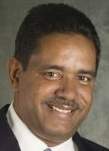
deJongh |
deJongh, John (Percy, Jr.), deJongh also spelled de Jongh (b. Nov. 13, 1957), governor of the U.S. Virgin Islands (2007-15).
Dekanozov, Vladimir (Georgiyevich) (b. June 1898, Baku, Russia [now in Azerbaijan] - d. [executed] Dec. 23, 1953, Moscow, Russian S.F.S.R.), Soviet politician. He was people's commissar of food industry (1936-38) and interior minister (1953) of the Georgian S.S.R. and Soviet ambassador to Germany (1940-41).
Del Bo, Dino, byname of Rinaldo Del Bo (b. Nov. 19, 1916, Milan, Italy - d. Jan. 16, 1991, Rome, Italy), president of the High Authority of the European Coal and Steel Community (1963-67). He was also Italian minister without portfolio (relations with parliament) (1957-59) and minister of foreign trade (1959-60).
del Campillo (Viana), Juan (Crisóstomo Nolasco) (b. Jan. 26, 1812, Córdoba, Córdoba, Argentina - d. May 10, 1866, Santa Fe, Santa Fe, Argentina), finance minister of Argentina (1854-56). He was also justice minister (1855-58) and ambassador to the Papal State (1858-61).
del Campo (Yávar), Máximo (b. 1849, Santiago, Chile - d. Aug. 13, 1935, Santiago), foreign minister of Chile (1903). He was also minister of justice and education (1892-93).
del Canto (Riquelme), Hernán (Marcelino) (b. Jan. 21, 1940, Santiago, Chile - d. Jan. 13, 2013), interior minister of Chile (1972). He was also secretary-general of government (1972-73).
del Carpio (Melgar), (Juan) Miguel (b. Sept. 20, 1795, Arequipa, Peru - d. Aug. 9, 1869, Lima, Peru), finance minister (1842), prime minister and foreign minister (1859-60), and acting interior minister (1859-60) of Peru; nephew of José Fabio Melgar. He was also president of the Senate (1860-63).
del Carril, Emilio Donato (b. Feb. 25, 1906, La Plata, Argentina - d. Jan. 14, 1985, La Plata), economy minister of Argentina (1958-59). He was also ambassador to the Soviet Union (1956-58) and the United States (1959-62).
Del Colle, Vincenzo (b. April 16, 1938, Rome, Italy), president of Abruzzo (1992-95).

Del Grande |
Del Grande, Marc (b. March 15, 1965, Laxou, Meurthe-et-Moselle, France), prefect of French Guiana (2019-20).
del Mar (Bernedo), Juan Manuel (b. Dec. 18, 1804 [or Dec. 7, 1806], Cusco, Peru - d. June 15, 1862, Lima, Peru), war and navy minister (1855-56), interior minister (1855-56, 1857-58), vice president (1858-62), and acting president (1859-60) of Peru. He was also minister of justice (1855-56), worship (1855-56, 1857-58), and public works (1857-58).
del Mazo (García), Gabriel (b. Nov. 4, 1898, Buenos Aires, Argentina - d. March 9, 1969, Buenos Aires), defense minister of Argentina (1958-59). He was also ambassador to Uruguay (1959-62).
del Mazo González, Alfredo (b. Dec. 31, 1943, Toluca, México state, Mexico - d. Jan. 10, 2019), governor of México (1981-86); son of Alfredo del Mazo Vélez. He was also Mexican minister of energy, mines, and parastatal industry (1986-88) and ambassador to Belgium (1988-90).
del Mazo Maza, Alfredo (b. Dec. 5, 1975, Toluca, México state, Mexico), governor of México (2017- ); son of Alfredo del Mazo González; third cousin of Enrique Peña Nieto. He was also mayor of Huixquilucan (2010-12) and director-general of the National Bank for Public Works and Services (2012-15).
del Mazo Vélez, Alfredo (b. Aug. 21, 1904, Atlacomulco, México state, Mexico - d. Dec. 19, 1975, Mexico City, Mexico), governor of México (1945-51); cousin of Isidro Fabela. He was also Mexican minister of water resources (1958-64).
del Pedregal Herrera, Guillermo (b. June 19, 1898, Santiago, Chile - d. 1981, Santiago), finance minister (1941-42, 1942-43, 1953-54) and interior minister (1952-53) of Chile. He was also economy and commerce minister (1943, 1953-54) and ambassador to the Soviet Union (1971-73).
del Río (Racet), Arturo (b. 1854, Valparaíso, Chile - d. Dec. 22, 1930, Iquique, Chile), justice (and education) minister of Chile (1912). He was also mayor of Iquique (1894-1909).
del Río (Soto Aguilar), José Raimundo (b. 1883, Santiago, Chile - d. 1966), finance minister of Chile (1906, 1910-11).
del Río, Manuel (b. 1791? - d. May 27, 1853), foreign and interior minister (1827 [acting], 1828 [acting], 1832, 1832 [acting], 1833-34 [acting], 1839 [acting]) and finance minister (1830, 1832, 1838, 1841, 1845-46, 1846-49) of Peru.
del Río Gundián, Sótero (b. March 29, 1900, Cauquenes, Chile - d. May 10, 1969, Houston, Texas), interior minister of Chile (1959-64). He was also minister of social welfare (1931-32), health, social security, and welfare (1943-46, 1952), and health (1959-61).
del Solar (Cárdenas), Amador (Felipe) (b. April 30, 1863, Lima, Peru - d. Aug. 22, 1926, Lima), interior minister of Peru (1906); son of Pedro Alejandrino del Solar. He was also president of the Senate (1916-17) and minister to Japan (1917-19).
del Solar (y Mendiburu), Emilio A(gustín) (b. Aug. 28, 1835, Arequipa, Peru - d. May 9, 1909, Lima, Peru), finance minister of Peru (1879).
del Solar (Gabás), Pedro Alejandrino (b. Nov. 26, 1829, Lima, Peru - d. June 10, 1909, Lima), prime minister and interior minister of Peru (1886, 1886-87, 1889-90). He was also justice minister (1881-82), first vice president (1890-94), and minister to Spain (1891-94).
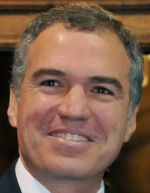
S. del Solar |
del Solar (Labarthe), Salvador (Alejandro Jorge) (b. May 1, 1970, Lima, Peru), prime minister of Peru (2019); great-great-grandson of Pedro Alejandrino del Solar. He was also culture minister (2016-17).
Del Turco, Ottaviano (b. Nov. 7, 1944, Collelongo, Abruzzo, Italy), Italian politician. After a career in trade unionism he rose to the top of Bettino Craxi's Socialist Party before it was swept away in the bribery scandals of 1992-94. He stayed on the centre-left and served as head of parliament's Anti-Mafia Commission between 1996 and 2000, then was finance minister in 2000-01. He was elected to the European Parliament in 2004 but stepped down after his election as president of the Abruzzo region in 2005. He was arrested July 14, 2008, in connection with a corruption probe in the public health sector; he was suspected of taking a bribe of almost 6 million euros. He resigned as Abruzzo president three days after his arrest.
del Val, Ricardo (Jaime) (b. Aug. 4, 1934, Puerto Santa Cruz, Santa Cruz, Argentina - d. [car accident] Jan. 5, 1996, near Stroeder, Buenos Aires province, Argentina), governor of Santa Cruz (1987-90).
del Valle Alliende, Jaime (b. July 2, 1931, Santiago, Chile - d. Aug. 29, 2016), foreign minister of Chile (1983-87). He was justice minister in 1983.
del Valle Jiménez, Sergio (b. April 15, 1927 - d. Nov. 15, 2007, Havana, Cuba), interior minister of Cuba (1968-79). He joined Fidel Castro's revolution against the dictator Fulgencio Batista through a Havana underground movement in the mid-1950s. He entered the rebel army as a doctor and soldier fighting against Batista's troops in eastern Cuba in 1957. After Batista fled and the rebels took control of the island on Jan. 1, 1959, General del Valle held various positions in Cuba's Revolutionary Armed Forces. He was army chief of staff when a United States-backed exile army tried unsuccessfully to invade the Bay of Pigs in 1961 and also when the United States discovered Soviet missiles on the island the following year, an episode that pushed the world to the brink of nuclear war. In 1979-85 he was minister of public health.
Delacombe, Sir Rohan (b. Oct. 25, 1906, St. Julians, Malta - d. Nov. 10, 1991, Salisbury, Wiltshire, England), British city commandant of Berlin (1959-62) and governor of Victoria (1963-74); knighted 1961.
Delacroix, Léon (Frédéric Gustave) (b. Dec. 27, 1867, Saint-Josse-ten-Noode, Belgium - d. Oct. 15, 1929, Baden-Baden, Germany), prime minister and finance minister (1918-20) and foreign minister (1920) of Belgium. Towards the end of 1917 he succeeded Edmond Picard as president of the Cassation Court and held this office until the end of World War I. He had not taken part in active political life when on Nov. 14, 1918, King Albert I entrusted him with the formation of a government in which the three great parties of Belgium were represented. Delacroix was minister of finance as well as prime minister. For a year from its formation the spirit of agreed unity with which the Delacroix ministry began its work persisted, and party strife was kept in the background. Gradually, however, in a country where before the war the parties had been accustomed to frequent and furious struggles, party politics inevitably crept back, and after the 1919 elections, which greatly increased the Socialist strength, the situation became delicate. First, the question of gratuities for ex-soldiers led to the resignation of Fulgence Masson, the defense minister. Next, Jules Renkin, the Catholic interior minister, withdrew; and soon after the refusal of the government to allow munitions for Poland to pass through Antwerp led to the resignation of Paul Hymans, the foreign minister, and he was followed by his two remaining Liberal colleagues. This meant the collapse of the three-party coalition, and the cabinet decided to resign on the king's return from a Brazilian tour. Delacroix later served as the permanent representative of the Belgian government on the Reparation Commission, as trustee for the railway bonds under the Dawes Plan, and as one of two Belgian delegates to the committee for the organization of the Bank for International Settlements.
Delacroix de Contaut, Charles (b. April 15, 1741, Givry-en-Argonne [now in Marne département], France - d. Oct. 26, 1805, Bordeaux, France), foreign minister of France (1795-97). He was also ambassador to the Batavian Republic (1797-98) and prefect of the départements of Bouches-du-Rhône (1800-03) and Gironde (1803-05). He was the father of the painter Eugène Delacroix.
Delamarre, Paul (Henri Désiré) (b. Dec. 10, 1878 - d. Oct. 4, 1956), administrator of Kwangchowan (1933-34).
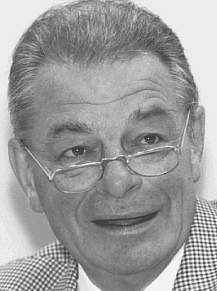
Delamuraz |
Delamuraz, Jean-Pascal (b. April 1, 1936, Paudex, Vaud, Switzerland - d. Oct. 4, 1998, Lausanne, Vaud), Swiss politician. After serving as mayor of Lausanne (1974-81) and a member of parliament (1975-83), he joined the seven-member Federal Council, or cabinet, as defense minister in 1984 and was economics minister from 1987 until his resignation in 1998. Delamuraz was president, a largely ceremonial post, in 1989 and 1996. He belonged to the centrist Radical Democrats, one of four parties in the governing coalition. The popular Delamuraz took Switzerland into the World Trade Organization, but suffered a setback in 1992 when the Swiss electorate voted against joining a loose European free trade grouping. The government then froze an application to join the more closely knit 15-nation European Union, which surrounds the country. He prompted an international outcry in 1997 when he said demands for a multimillion-dollar fund to compensate Jews who lost assets in the Holocaust amounted to blackmail. The remark was a public relations debacle for the country and Delamuraz eventually apologized.
Delaney, John (Kevin) (b. April 16, 1963, Wood-Ridge, N.J.), U.S. politician. He was a representative from Maryland (2013-19) and a candidate for the 2020 Democratic presidential nomination.
Delaney, John A(drian) (b. June 29, 1956, Lansing, Mich.), mayor of Jacksonville (1995-2003).
Delangle, Claude Alphonse (b. April 6, 1797, Varzy, Nièvre, France - d. Dec. 25, 1869, Paris, France), interior minister (1858-59) and justice minister (1859-63) of France. He was also prosecutor-general at the Court of Cassation (1852-53, 1865-69) and president of the Municipal Commission (1852-55) and the Municipal Council (1855-57) of Paris.
Delanney, Marcel (François) (b. April 25, 1863, Le Mans, Sarthe, France - d. Feb. 22, 1944, Paris, France), prefect of Seine département (1911-18). He was also prefect of the départements of Ariège (1900-02), Sarthe (1902-04), Corse (1904-05), and Haute-Vienne (1905-07).
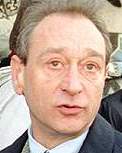
Delanoë |
Delanoë, Bertrand (b. May 30, 1950, Tunis, Tunisia), mayor of Paris (2001-14). He became secretary of the Socialist Federation of Aveyron département at the age of 23. His potential was spotted by François Mitterrand, the Socialist Party leader, and he rose fast, becoming a Paris city councillor. He was elected a deputy to the National Assembly in 1981, and in 1983 he became head of the Socialist Party's national federations. At 33 he was effectively number three in the ruling Socialist Party. In 1986 he lost his National Assembly seat, though he kept his seat on the Paris city council. He returned to prominence when he became leader of the Socialist group on the city council in 1993, and he led it into the 1995 election with modest success, taking 6 of the 20 arrondissements from the right. That same year saw Jacques Chirac end his 18 years as mayor of Paris when he became president. The system of government that Chirac had installed in Paris came under growing criticism and judicial investigation for possible "kickbacks." This, and internecine warfare among Chirac's political heirs in the Gaullist party, the Rally for the Republic (RPR), contributed heavily to Delanoë's victory when he ran for mayor in 2001. His avowed homosexuality proved to be a non-issue, and his low-key style and persistence eventually came to be preferred by Parisians to the higher-profile Socialist rivals who at several points looked certain to eclipse him. He was helped mightily by the split in the RPR ranks between Philippe Séguin, the official RPR candidate, and Jean Tiberi, the incumbent RPR mayor, who had split with his party but still ran for reelection. Delanoë was able to secure backing from the Greens and won fairly easily in the runoff, becoming the first Socialist mayor of Paris since 1871. He was reelected in 2008.
Delattre, François (Marie) (b. Nov. 15, 1963, Saint-Marcellin, Isère, France), French diplomat. He was ambassador to Canada (2008-11) and the United States (2011-14) and permanent representative to the United Nations (2014-19). In 2022 he was appointed ambassador to Germany.
Delaunay, Jacques Robert (b. May 16, 1921, Ezy-sur-Eure, Eure, France - d. Jan. 16, 2006, Villeneuve-lès-Avignon, Gard, France), prefect of French Guiana (1972-74). He was also prefect of the départements of Corse (1974-75) and Marne (1978-80).
Delauney, Maurice (Charles Jules) (b. May 31, 1919, La Haye-du-Puits, France - d. Dec. 1, 2009, Cannes, France), French resident commissioner of the New Hebrides (1960-65). He was ambassador to Gabon (1965-72, 1975-79) and Madagascar (1972-75) and mayor of Cannes (1996-2001).
Delavenne, Maurice (b. Oct. 15, 1914, Lille, France - d. March 21, 2001, Plan-de-Cuques, Bouches-du-Rhône, France), interior minister of Monaco (1961-65). He was also ambassador to France (1965-70).
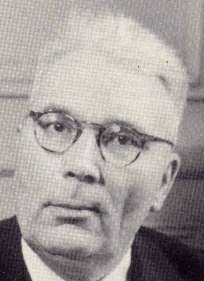
Delavignette |
Delavignette, Robert (b. March 29, 1897, Sainte-Colombe-sur-Seine, Côte-d'Or, France - d. Feb. 4, 1976, Paris, France), high commissioner of French Cameroons (1946-47).
Delba, Mikhail (Konstantinovich) (b. 1905, Adzyubzha, Sukhumi okrug, Kutaisi province, Russia [now in Abkhazia, Georgia] - d. 1992), chairman of the Presidium of the Supreme Soviet (1938-48) and chairman of the Council of Ministers (1948-53) of the Abkhaz A.S.S.R. He was also people's commissar of education (1937-38).
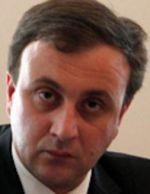
V. Delba |
Delba, Vladimir (Valeryevich) (b. Sept. 26, 1974, Sukhumi, Abkhaz A.S.S.R., Georgian S.S.R.), acting prime minister of Abkhazia (2014). He has been a deputy prime minister and finance minister (2011-14, 2020- ).
Delbos, Yvon (b. May 7, 1885, Thonac, Dordogne, France - d. Nov. 15, 1956, Paris, France), French foreign minister (1936-38) and interim defense minister (1947). He was also minister of education (1925, 1939-40, 1940, 1948, 1948-50) and a minister of state (1947).
Delbrück, Clemens (Gottlieb Ernst) von (b. Jan. 19, 1856, Halle, Prussia [now in Sachsen-Anhalt, Germany] - d. Dec. 17, 1921, Jena, Thüringen, Germany), Oberpräsident of Westpreussen (1902-05) and vice chancellor and interior minister of Germany (1909-16). He was also lord mayor of Danzig (1896-1902). He was ennobled (adding "von") in 1916.
Delbrück, (Martin Friedrich) Rudolf von (b. April 16, 1817, Berlin, Prussia [Germany] - d. Feb. 1, 1903, Berlin), president of the Chancellery of Germany (1871-76). He was ennobled (adding "von") in 1896.
Delcassé, Théophile (b. March 1, 1852, Pamiers, Ariège, France - d. Feb. 22, 1923, Nice, France), foreign minister of France (1898-1905, 1914-15). He was also minister of colonies (1894-95), marine (1911-13), and war (1914) and ambassador to Russia (1913-14).
Delcroix, Leo (b. Nov. 21, 1949, Kalmthout-Nieuwmoer, Belgium - d. Nov. 2, 2022, Genk, Belgium), defense minister of Belgium (1992-94).
Delden, Reinier O(swald) van (b. Nov. 3, 1928, Sint Maarten - d. Feb. 25, 2011, Simpson Bay, Sint Maarten), administrator of Sint Eustatius (1958-61, 1976), acting administrator of Saba (1962, 1964), and administrator of Sint Maarten (1968-75).
Delebarre, Michel (b. April 27, 1946, Bailleul, Nord, France - d. April 9, 2022, Lille, France), president of the Regional Council of Nord-Pas-de-Calais (1998-2001). He was also French minister of labour, employment, and vocational training (1984-86), social affairs and employment (1988), transports and sea (1988-90), equipment and housing (1989-90), city (1990-92), regional planning (1991-92), and civil service and administrative reforms (1992-93) and mayor of Dunkerque (1989-2014).
DeLee, Debra, née Epstein (b. 1948, Chicago, Ill.), U.S. politician. In the 1980s she served as a special assistant to Gov. Bob Graham of Florida. During that time, she directed both the Florida Commission on the Status of Women and the Florida Office of Voluntary Citizen Participation. She also held a variety of positions with the National Education Association (NEA) during the 1980s, including political action manager, as well as director of political affairs for NEA's Florida affiliate. She served as the NEA's director of government relations in 1990-93; she managed their grassroots lobbying, directed federal relations, and oversaw all political advocacy efforts. A veteran of Democratic politics, she was elected vice chair of the Democratic National Committee (DNC) in January 1993. Later that year, she was named executive director. DeLee served as chair of the DNC from November 1994 to January 1995. She also served on the Democratic Party's Site Selection Committee, the Platform Drafting Committee, and the Resolutions Committee. DeLee was selected in September 1994 to serve as chief executive officer of the 1996 Democratic National Convention in Chicago; she oversaw all convention activities including the budget process, contracting, coordination with the White House and elected officials, interaction with Chicago's Host Committee, and communications. A highly regarded political strategist, she was chosen as one of the "74 Women Who Are Changing American Politics" by Campaigns and Elections Magazine. DeLee received numerous awards for her work with the state parties including the John A. Wilson Award for Community Service from the Democratic Party of the District of Columbia. She also received the 1994 Leadership Award from Democrats 2000.
Deleplanque, Jean (Marie Louis) (b. Aug. 26, 1919, Paris, France - d. June 7, 2021, Nice, France), prefect of Guadeloupe (1967-69). He was also prefect of the départements of Gers (1964-67), Var (1969-71), Côte-d'Or (1973-76), and Moselle (1976-78).
Delessert, (Abraham) Gabriel (Marguerite) (b. March 17, 1786, Paris, France - d. Jan. 29, 1858, Passy [now part of Paris], France), prefect of police of Paris (1836-48). He was also prefect of the départements of Aude (1834) and Eure-et-Loir (1834-36).
Delfosse, Antoine (Louis Philippe Ghislain) (b. June 25, 1895, Incourt, Belgium - d. June 5, 1980, Liège, Belgium), justice minister of Belgium (1942-44, in exile). He was also minister of labour and social welfare (1939), supplies (1939-40), and communications (1940).
Delgadillo, Teodoro, finance minister (1873-75) and minister of interior, justice, and ecclesiastical affairs (1883-87) of Nicaragua. He was also minister of development (1868-71).
Delgado, Epitácio Motta (d. Aug. 6?, 2002), governor of Fernando de Noronha (1975-77).
Delgado, Eulogio (b. 1838? - d. Feb. 15, 1912, Lima, Peru), finance minister of Peru (1889-90).
Delgado, Francisco A(fan) (b. Jan. 25, 1886, Bulacan province, Philippines - d. Oct. 27, 1964, Manila, Philippines), Philippine diplomat. He was resident commissioner to the United States (1935-36) and permanent representative to the United Nations (1958-62).
Delgado (Mocarquer), Rodrigo (Javier) (b. June 13, 1974), interior minister of Chile (2020-22).
Delgado (Salazar), (Miguel) Wenceslao (b. Sept. 29, 1878, Tiabaya, Arequipa, Peru - d. June 12, 1942, Lima, Peru), justice minister of Peru (1932-33, 1935-36). He was also education minister (1932-33).
Delgado Barreneche, Rafael (b. July 24, 1906, Santa Marta, Colombia - d. July 1, 1983, Bogotá, Colombia), finance minister of Colombia (1950-51). He was also minister of development (1958-59).
Delgado Barreto, César (Augusto) (b. Nov. 18, 1927, Lima, Peru), justice minister of Peru (1988-89).

Delgado C. |
Delgado Chalbaud (Gómez), Carlos (Román) (b. Jan. 20, 1909, Caracas, Venezuela - d. Nov. 13, 1950, Caracas), chairman of the military junta of Venezuela (1948-50). He was an army officer who headed a coup in 1948 that exiled Pres. Rómulo Gallegos. Earlier, in 1945, he was one of the leaders of another military coup that first installed Rómulo Betancourt as provisional president. Delgado Chalbaud was assassinated in 1950.
Delgado Ramírez, Celso Humberto (b. Oct. 29, 1942, Tepic, Nayarit, Mexico), governor of Nayarit (1987-93). He was also Mexican ambassador to Egypt and Algeria (1973), Argentina (1973-75), and Cuba (1975-77).
Delgado Rannauro, Dante (Alfonso) (b. Dec. 23, 1950, Alvarado, Veracruz, Mexico), governor of Veracruz (1988-92). He was also Mexican ambassador to Italy (1993-94).
Deliau, Jean (Eugène) (b. Oct. 1, 1913, Bar-le-Duc, Meuse, France - d. May 5, 1996, Pau, Pyrénées-Atlantiques, France), prefect of Martinique (1967-69). He was also prefect of Haute-Saône département (1963-67).
Delich, Andrés (Guillermo) (b. June 20, 1962, Paris, France), education minister of Argentina (2001).
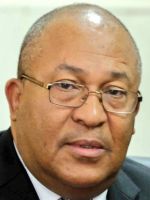
Delienne |
Delienne, Pierrot (b. Dec. 13, 1954), foreign minister (2016-17) and interim interior minister (2016) of Haiti.
Deligiannis, Nikolaos (Petrou) (b. 1845, Athens, Greece - d. Jan. 18, 1910, Paris, France), prime minister and foreign minister of Greece (1895); son of Petros Deligiannis. He was also minister to Serbia (1881-85) and France (1886-93).
Deligiannis, Petros (A.) (b. 1812, Constantinople, Ottoman Empire [now Istanbul, Turkey] - d. July 27, 1872, Athens, Greece), foreign minister of Greece (1850-51, 1863-64, 1868-69). He was also provisional minister of finance and of ecclesiastical affairs and public education (1850).
Deligiannis, Theodoros (Pangaiou), also spelled Theódoros Dhiliyiánnis (b. April 1826, Kalavrita, Greece - d. June 13 [May 31, O.S.], 1905, Athens, Greece), prime minister of Greece (1885-86, 1890-92, 1895-97, 1902-03, 1904-05). He was also minister of foreign affairs (1863, 1864, 1864, 1869-70, 1878, 1878-80, 1885-86), finance (1870, 1871-72, 1878-80, 1885-86, 1891-92, 1895-97, 1902-03), ecclesiastical affairs and public education (1877-78, 1896-97), marine (1885), military (1886, 1890-92, 1903), interior (1890-92, 1904-05), and justice (1902) and ambassador to France (1867-68). In 1878, as foreign minister in the government of Alexandros Koumoundouros, he advocated Greek intervention in the Russo-Turkish War; later that year he was a delegate to the Congress of Berlin, which sought to solve the Eastern Question. While his rival Charilaos Trikoupis advocated constitutional government and internal reform, Deligiannis, a supporter of the Great Idea (Megali Idea) that promised the liberation of all Greeks under Turkish rule and even the recovery of Constantinople (Istanbul), occupied himself primarily with an aggressive foreign policy and organized his followers into the conservative Nationalist Party, in opposition to Trikoupis' Liberal Party. In 1885 he formed his first government and, inspired by the Bulgarian declaration of complete independence from Turkey, prepared to invade Turkish Macedonia, an adventure that was stopped only when the great powers blockaded Greek ports. Spurred on by the 1896 revolt on Crete against Turkish rule, he declared war on Turkey in April 1897, sending a fleet to the island and an army led by Crown Prince Konstantinos into Macedonia and Epirus. The army was defeated, and Greece was forced to yield 12 strategic points along its northern border to Turkey. Resigning as prime minister, he kept his seat in the Chamber of Deputies, though he had lost much of his popular following. Nevertheless, he became prime minister again but was fatally stabbed by a keeper of a gambling house which had been shut.
Delisle, (Louis Henri) Hubert (b. Jan. 1, 1811, Saint-Benoît, Réunion - d. Dec. 9, 1881), governor of Réunion (1852-58).
Deljo, Zijad (b. July 13, 1959), premier of Bosnian Podrinje (...-2000).
Dellenback, John R(ichard) (b. Nov. 6, 1918, Chicago, Ill. - d. Dec. 7, 2002, Medford, Ore.), director of the Peace Corps (1975-77).
Dellingshausen, Hans von (b. March 24, 1641, Göteborg, Sweden - d. Jan. 8, 1705, Halmstad, Halland, Sweden), governor of Halland (1698-1705).
Delong, Armin (b. Jan. 29, 1925, Bartovice, Czechoslovakia [now part of Ostrava, Czech Republic] - d. Oct. 5, 2017, Brno, Czech Republic), Czechoslovak politician. Better known as a physicist, he was a deputy premier and chairman of the State Commission for Scientific-Technical and Investment Development (1990).
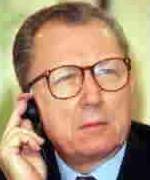
Delors |
Delors, Jacques (Lucien Jean) (b. July 20, 1925, Paris, France), president of the European Commission (1985-94). He became active in the Christian Trade Union Confederation (renamed the Democratic Trade Union Confederation in 1964) and was named its economic adviser in 1950. In 1962 he left the Banque de France, where he had quickly risen to an executive position, to head the social-affairs division of the state's General Planning Commission. From 1969 to 1972 he served as chief adviser on social affairs to Prime Minister Jacques Chaban-Delmas's "new society" program. Delors joined the Socialist Party in 1974 and in 1976 became the party's national delegate for international economic relations. In 1979 he was elected to the European Parliament, where he served as chairman of the economic and monetary committee. In 1981 François Mitterrand, the newly elected Socialist president, appointed Delors minister of economics and finance. The French economy was then in recession, and Delors initially carried out the Socialist recovery plan of increasing government controls and spending. He eventually convinced Mitterrand to accept his program of austerity, however, which succeeded in restoring relative economic stability. Delors was elected president of the European Commission in July 1984, at the time of a change of government in France, so he gave up his cabinet post; his European appointment took effect Jan. 1, 1985. He revitalized the long-stalled EC, pushing through reforms and persuading the member states to agree to the creation of a single market, to take effect from Jan. 1, 1993, the first step toward full economic and political integration.
Delouvrier, Paul (Albert Louis) (b. June 25, 1914, Remiremont, Vosges, France - d. Jan. 16, 1995, Provins, Seine-et-Marne, France), delegate-general of Algeria (1958-60).
Delpech, Léonce Joseph (b. Oct. 24, 1886 - d. Jan. 5, 1954), acting commissioner of French Togo (1941).
Delpech, Marcelo (Emilio Rafael), Argentine diplomat. He was permanent representative to the United Nations (1986-89) and ambassador to Morocco (1989-94).
Delpuech, Michel (b. Feb. 13, 1953, Aurillac, Cantal, France), prefect of police of Paris (2017-19). He was also prefect of the départements of Hauts-de-Seine (2003-06), Corse-du-Sud (2006-07), Somme (2009-12), Gironde (2012-15), Rhône (2015-17), and Paris (2017).
Delsalle, Pierre (Abel) (b. 1886 - d. 1955, Royan, Charente-Inférieure [now Charente-Maritime], France), resident-superior of Tonkin (1941-42).
Delsia Soussia, Robert (b. 1932, Molfoudaye, Fianga district, Chad), defense minister of Chad (1962-64). He was also minister of social affairs (1960-62).
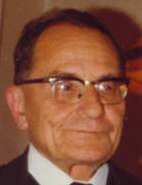
Delteil |
Delteil, Pierre (Jean Marie) (b. Oct. 1, 1907 - d. April 9, 2002), governor of Oubangui-Chari (1949-50).
Delvalle (Cohen-Henríquez), Eric Arturo (b. Feb. 2, 1937, Panama City, Panama - d. Oct. 2, 2015, Cleveland, Ohio), president of Panama (1985-88); nephew of Max Delvalle. In 1968 he was elected congressman and became vice-president of the National Assembly. He was chosen president of the Republican Party in 1983 and was later nominated vice-presidential candidate by the coalition that narrowly - and disputedly - triumphed in the 1984 elections. The moderate Republican Party was the smallest partner in the coalition led by the left-of-centre Revolutionary Democratic Party (PRD). The mysterious murder in September 1985 of Hugo Spadafora - a controversial former minister of health - created a political scandal that was largely responsible for the resignation, on September 28, of Pres. Nicolás Ardito Barletta Vallarino. Vice President Delvalle was sworn in as president the same day. Immediately after the presidential transition the PRD dictated a series of economic policies that would have led inevitably to a confrontation with the nation's foreign creditors. The National Guard, Panama's defense force - which clearly played a major role in the "easing out" of Ardito Barletta - seemed willing enough to let Delvalle try to solve the country's economic problems, especially after some opposition politicians claimed there was a link between the military and the Spadafora murder. Delvalle showed from the beginning that he intended to maintain an independent course. He rebuffed the PRD's policy demands when he informed the nation's creditors that he would continue the moderate economic policies of his predecessor. In 1988 he was removed from office by Manuel Noriega, but continued to be internationally recognized until the end of his term in 1989; meanwhile, he went into exile in the U.S.
Delvalle (Levy-Maduro), Max, original name Max Salom del Valle Levy-Maduro (b. Feb. 27, 1911, Panama City, Panama - d. Dec. 20, 1979, Panama City), Panamanian politician. He was first vice president (1964-68) and president in rebellion (1968).
Delvina, Sulejman Bej (b. Oct. 5, 1884, Delvina region, Ottoman Empire [now in Albania] - d. Aug. 1, 1932, Vlorë, Albania), chairman of the National Government (1920), prime minister (1920), interior minister (1921), and foreign minister (1924) of Albania.
Delyanov, Ivan (Davydovich) (b. Dec. 12 [Nov. 30, O.S.], 1818, Moscow, Russia - d. Jan. 10, 1898 [Dec. 29, 1897, O.S.], St. Petersburg, Russia), education minister of Russia (1882-98). He was also director of the Imperial Public Library (1861-82).
Démafouth, Jean-Jacques (b. Oct. 3, 1959, Bangui, Central African Republic), defense minister of the Central African Republic (1999-2001). He was a minor presidential candidate in 2005.
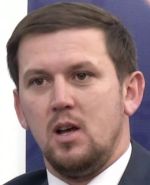
Demaj |
Demaj, Emanuel (b. Jan. 1, 1982, Stubëll e Epërme, Kosovo, Serbia), acting foreign minister of Kosovo (2017).
Demakova, Helena (b. Sept. 3, 1959, Riga, Latvian S.S.R.), acting foreign minister of Latvia (2004, 2007). She was culture minister (2004-09).
Demange, Paul (b. June 4, 1906, Schlettstadt, Germany [now Sélestat, Bas-Rhin, France] - d. April 18, 1970, Paris, France), prefect of Réunion (1947-50) and minister of state of Monaco (1966-69). He was also prefect of the départements of Saône-et-Loire (1942-43), Seine-et-Marne (1943), Oran (1950-51), Bas-Rhin (1951-56), and Seine-et-Oise (1956-66).
Demarco, Aníbal Vicente (b. 1927 - d. Oct. 21, 2007), social welfare minister of Argentina (1975-76).
Demaría, Mariano (b. March 10, 1842, Buenos Aires, Argentina - d. May 23, 1921, Buenos Aires), finance minister of Argentina (1893). He was also minister to Uruguay (1903-05) and Spain and Portugal (1905-06).
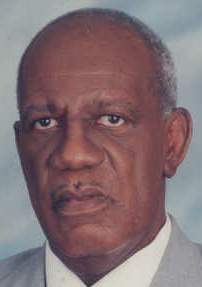
Demas |
Demas, William (Gilbert) (b. Nov. 14, 1929, Port-of-Spain, Trinidad and Tobago - d. Nov. 28, 1998, Port-of-Spain), secretary-general of the Caribbean Community (1973-74). A Trinidadian economist, he headed the Caribbean Free Trade Area beginning in 1970 and was the first leader of the group's successor, the 15-member Caribbean Community. He presided over the July 1973 signing in Trinidad of the Treaty of Chaguaramas that formed the Caribbean Community. Demas is credited with helping to stabilize the economies of the Caribbean in the 1970s after they achieved independence from Britain. He helped form the Caribbean Development Bank, serving as its president in 1974-88, and was governor of Trinidad and Tobago's central bank in 1988-92.
Demba, Sow Abou, foreign minister of Mauritania (1997). He was also minister of justice (1992-95), trade and tourism (1995-96, 1997), rural development and the environment (1996), and health and social affairs (1996-97).
Dembowski, Jan (Bohdan) (b. Dec. 26, 1889, St. Petersburg, Russia - d. Sept. 22, 1963, Warsaw, Poland), Polish politician. He was president of the Polish Academy of Sciences (1952-57), marshal of the Sejm (1952-56), and a deputy chairman of the Council of State (1952-57).
Dembri, Mohamed Salah (b. Jan. 30, 1938, El Harrouch, Skikda, Algeria - d. Jan. 2, 2020, France), foreign minister of Algeria (1993-96). He was also ambassador to Canada (1982-84), Greece (1992-93), the Vatican (1997-2004), and the United Kingdom (2005-10).

Demchuk |
Demchuk, Nikolay (Vasilyevich) (b. 1949, Starominskaya, Krasnodar kray, Russian S.F.S.R.), prime minister of Adygeya (2002-03).
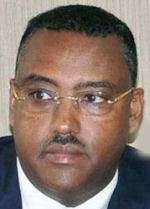
Demeke |
Demeke Mekonnen (Hassen) (b. Sept. 27, 1963, Mota district, Gojam province, Ethiopia), foreign minister of Ethiopia (2020- ). He has also been education minister (2008-13) and a deputy prime minister (2012- ).
Dementyey, Nikolay (Ivanovich) (Russian), Belarusian Mikalay (Ivanavich) Dzemyantsyey (b. May 25, 1930, Khotlino [now in Vitebsk oblast], Belorussian S.S.R. - d. July 10, 2018), chairman of the Presidium of the Supreme Soviet (1989-90) and chairman of the Supreme Soviet (1990-91) of the Belorussian S.S.R.
Demerdzhiev, Ivan (Petev) (b. Dec. 12, 1975, Plovdiv, Bulgaria), justice minister (2021) and interior minister and a deputy prime minister (2022- ) of Bulgaria.
Demicheli (Lizaso), (Pedro) Alberto (b. Aug. 7, 1896, Rocha, Uruguay - d. Oct. 12, 1980, Montevideo, Uruguay), president of Uruguay (1976). He was minister of public education (1930-31) and interior (1932-33, 1934).
Demidov, Mikhail (Denisovich) (b. Nov. 20 [Nov. 8, O.S.], 1842 - d. Oct. 7 [Sept. 25, O.S.], 1898, Shlisselburg, near St. Petersburg, Russia), governor of Olonets (1892-98); grandson of Fyodor Mirkovich.
Demidov, Pavel (Nikolayevich) (b. Aug. 17 [Aug. 6, O.S.], 1798 - d. April 6, 1840, Mainz, Hesse [now in Rheinland-Pfalz, Germany]), governor of Kursk (1831-34).
Demidov, Pavel (Pavlovich) (b. Oct. 21, 1839, Weimar, Saxe-Weimar-Eisenach [now in Thüringen, Germany] - d. Jan. 26, 1885, Vaglia [now in Firenze metropolitan city], Italy), Russian politician; son of the above. He was mayor of Kiev (1871-72, 1873-74).
Demidov, Yelim (Pavlovich) (b. Aug. 6, 1868, Vienna, Austria - d. March 28, 1943, Athens, Greece), Russian diplomat; son of Pavel Demidov (1839-1885). He was minister to Greece (1912-17).
Demikhovsky, David (Veniaminovich) (b. 1899, Parichi, Minsk province, Russia [now in Belarus] - d. [executed] Jan. 15, 1938, Stalingrad, Russian S.F.S.R. [now Volgograd, Russia]), first secretary of the Communist Party committee of North Ossetian autonomous oblast (1931-34).
Demiraj, Dritan (Baki) (b. May 24, 1969, Tiranë, Albania), interior minister of Albania (2017).
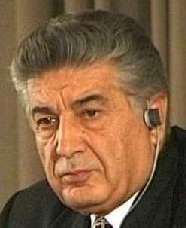
Demirchyan |
Demirchyan, Karen (Serobovich), Armenian Karen (Serobi) Demirchyan (b. April 17, 1932, Yerevan - d. Oct. 27, 1999, Yerevan), Armenian politician. He became a secretary of the Yerevan City Communist Party Committee in 1966 and first secretary of the Armenian Communist Party in 1974. In 1988 the Kremlin removed him for failing to cope with the republic's growing nationalist and independence movement. He spent the subsequent decade out of politics. He broke his silence only once, to endorse the candidacy of Levon Ter-Petrosyan in the September 1996 presidential elections. He made a sudden political comeback in 1998. After Ter-Petrosyan's forced resignation in February of that year, Demirchyan was one of 12 candidates who contested the pre-term presidential elections, campaigning on his image and appeals to those nostalgic for the more prosperous, predictable period many associated with his rule. He proved especially popular with poorer Armenians hit hard by post-independence economic woes. "There is a nostalgia for a dignified life, not cheap sausage. People remember their dignity," Demirchyan said during the campaign. "We are going to return it to them." He lost to Robert Kocharyan, then prime minister, in the runoff. Demirchyan refused to accept the validity of that runoff, which he claimed to have won. He founded the People's Party in 1998 following his unsuccessful bid for the presidency. He and Defense Minister Vazgen Sarkisyan, head of the Republican Party, led their Unity alliance to victory in a parliamentary election on May 30, 1999. Sarkisyan became prime minister and Demirchyan was appointed parliamentary speaker. Later that year, he was among those killed in a shooting incident in parliament.
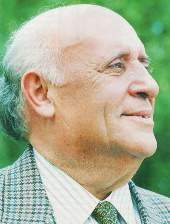
Demirel |
Demirel, Süleyman (Sami), before 1935 Süleyman Sami (bin Yahya) Bey (b. Oct. 6, 1924, Islamköy village, Isparta province, western Turkey - d. June 17, 2015, Ankara, Turkey), president of Turkey (1993-2000). He entered politics in 1961 and was elected to the National Assembly that same year as a member of the Justice Party (JP), becoming the party's leader in 1964. In February 1965 he became deputy prime minister and on Oct. 27, 1965, after the general elections, he became the youngest prime minister in his country's history. He improved Turkey's ties with its NATO allies and instituted development programs for his basic constituency, the Turkish peasantry. He was reelected in 1969, but his moderate policies faced growing opposition from both the left and the right, and, upon his refusal to allow the military to assume a policy-making role in efforts to combat terrorism, Turkey's military commanders forced him to resign in March 1971. In March 1975 a coalition of the JP and smaller right-wing parties in a Nationalist Front once more restored him to the prime ministry. He pursued a policy of economic growth, in spite of civil violence and terrorism from extremist factions, inflation, and a trade deficit. But the electoral coalitions that now enabled him to maintain power were inherently weak, unstable, and governmentally ineffective. His fourth ministry fell in June 1977, but he achieved a fifth prime ministry from July to December 1977 and a sixth from November 1979 to September 1980. As the country continued to be torn apart by extremist violence, the military overthrew his government on Sept. 12, 1980. Demirel was banned from participating in politics for a time, but he once more was returned to office as prime minister in November 1991, with the election defeat of the governing Motherland Party. He resigned that post in May 1993 after he was elected president of Turkey.
Demôle, Charles (Étienne Émile) (b. March 22, 1828, Charolles, Saône-et-Loire, France - d. June 18, 1908, Saint-Julien-de-Civry, Saône-et-Loire), justice minister of France (1886). He was also minister of public works (1885-86).
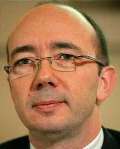
Demotte |
Demotte, Rudy (b. June 3, 1963, Ronse, Belgium), minister-president of Wallonia (2007-14) and of the French community (2008-19). He was also Belgian minister of social affairs (2003-07).
Dempsey, John J(oseph) (b. June 22, 1879, White Haven, Pa. - d. March 11, 1958, Washington, D.C.), governor of New Mexico (1943-47).
Demsar, Franci (b. Feb. 4, 1960, Ledenice, Slovenia), defense minister of Slovenia (1999-2000). He was also director of the Public Agency for Research (2004-14).
Demyanov, Aleksandr (Alekseyevich) (b. Dec. 5, 1865, St. Petersburg, Russia - d. April 27, 1925, Prague, Czechoslovakia [now in Czech Republic]), acting justice minister of Russia (1917). He was also a member of the State Duma (1907).
Demydenko, Arkadiy (Fedorovych) (b. Jan. 29, 1950, Kagarlyk, Kiev oblast, Ukrainian S.S.R. - d. Sept. 28, 2005, Kiev, Ukraine), prime minister of Crimea (1996-97).
Den, Vladimir (Aleksandrovich fon), German Woldemar Carl von Daehn (b. Feb. 20, 1838, Sippola [now part of Kouvola], Finland - d. Dec. 28, 1900, Rome, Italy), governor of Stavropol (1877-82) and Viborg (1882-85) and minister state secretary of Finland (1891-98); son-in-law of Knyaz Dmitry Svyatopolk-Mirsky.
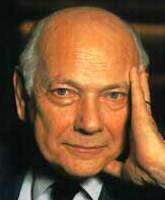
den Uyl |
den Uyl, Joop, byname of Johannes Marten den Uyl (b. Aug. 9, 1919, Hilversum, Noord-Holland, Netherlands - d. Dec. 24, 1987, Amsterdam), prime minister of the Netherlands (1973-77). He was a Resistance worker during World War II. He joined the newly formed Labour Party (1946) and became director of its Scientific Bureau (1949). He was elected a Labour representative to the Amsterdam city council (1953) and entered parliament (1956). As minister of economic affairs (1965-66), he encouraged the Dutch North Sea gas- and oil-extraction industries. He was leader of the opposition in 1967-73. As prime minister, heading a coalition of left-wing parties, he had ambitious plans for social reform, but his administration was plagued with economic difficulties. In 1976 he successfully dissuaded Queen Juliana from abdicating when her consort, Prince Bernhard, was implicated in the Lockheed scandal. Although Labour won most gains in the election in 1977, den Uyl, whose policies were radical and whose style was compromising, proved unable to form a government. He was minister of social affairs, employment, and Antillean affairs in 1981-82 and was again leader of the opposition in 1982-86.
Denaj, Anila (Spiro) (b. Sept. 18, 1973, Tiranë, Albania), finance minister of Albania (2019-21).
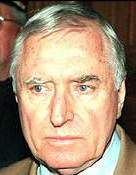
Denard |
Denard, Bob, byname of Robert Denard, pseudonym Gilbert Bourgeaud (b. Jan. 20, 1929, Lesparre-Médoc, Gironde, France - d. Oct. 13, 2007, Paris area, France), French mercenary. After enlisting in the French navy, he served in Indochina, then joined (1952) the police force of French Morocco. He was convicted of taking part in an assassination attempt against French prime minister Pierre Mendès-France, but after serving a 14-month jail term, he was acquitted of any wrongdoing and returned to France. In 1961, after answering a newspaper advertisement for "security men," he returned to Africa as a mercenary. He enlisted under the Katangan separatist leader Moise Tshombe, followed by an interlude in Yemen, resurfaced in the Congo in 1965, went on to Angola and then to France, returned to Africa in 1968 to fight with the Biafran separatists, and was involved with an attempted coup in Benin in 1977. The high point in his adventurous career came with his May 1978 coup in the Comoros. With some 50 mercenaries, he overthrew Pres. Ali Soilih, the same man he had helped to power three years before, and reinstated former president Ahmed Abdallah. He was appointed chief of staff of the Comoran army and took Comoran nationality under the name of Said Moustapha Mahdjou. Under pressure from international opinion he had to step down in September 1978. He took control of the Presidential Guard, but in 1989, following the assassination of Abdallah, France sent a naval task force to remove Denard and his mercenaries from the Comoros. He went into exile in South Africa, but voluntarily returned to France in February 1993 to face a 5-year prison sentence for his role in the failed coup in Benin. On April 5 the original sentence was overturned and replaced with a 5-year suspended term. In 1995 he again attempted a coup in the Comoros. He was tried in 1999 in connection with the assassination of Abdallah but was finally cleared. A Parisian court found him guilty on June 20, 2006, of "criminal conspiracy in preparation of a crime" for his role in the arrest and the sequestration of the then Comorian president Said Mohamed Djohar in the 1995 coup. He was given a 5-year suspended sentence. On July 6, 2007, a Paris appeal court sentenced him to 4 years in prison, 3 of them suspended; he never served due to ill health.
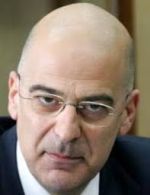
Dendias |
Dendias, Nikos (b. Oct. 7, 1959, Corfu, Greece), defense minister (2014-15) and foreign minister (2019- ) of Greece. He was also minister of justice (2009), public order and citizen protection (2012-14), and development and competitiveness (2014).
Denegri (Valega), Aurelio (b. 1840 - d. Feb. 19, 1909), prime minister of Peru (1881, 1887-89). He was also mayor of Lima (1874-75), minister of finance and commerce (1881) and interior, police, and public works (1887-89), and second vice president (1886-90).
Déneke (Siguí), (Franz) Rolando (b. Jan. 12, 1926 - d. Aug. 20, 2009), foreign minister of El Salvador (1960-61).
Deng, Francis (Mading) (b. 1938, near Abyei, Sudan), South Sudanese diplomat. He was Sudanese ambassador to Denmark, Finland, Norway, and Sweden (1972-74), the United States (1975-76), and Canada (1980-83) and South Sudanese permanent representative to the United Nations (2012-16).
Deng (Garang Alier), Gatluak (b. March 1953, Nasir, Sudan [now in South Sudan] - d. Jan. 13, 2014, Cairo, Egypt), chairman of the Southern Sudan Coordination Council (2001-02). He was also governor of Upper Nile state (1989-92, 2008-09).
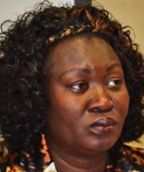
Deng Acuil | 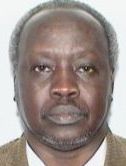
Deng Nhial |
Deng Acuil, Awut, foreign minister of South Sudan (2019-20). She has also been minister of labour and public service (2010-13), gender, child and social welfare (2013-19), and general education and instruction (2020- ).
Deng Alak, Chol (b. Aug. 24, 1955, Abyei, Sudan), administrator of Abyei (2015-17, 2023- ). He was also Sudanese (2004-08) and South Sudanese (2012-15) ambassador to Russia.
Deng Nhial, Nhial (b. May 12, 1957, Tonj, Sudan [now in South Sudan]), defense minister (2008-11) and foreign minister (2011-13, 2018-19) of South Sudan. He was also minister of regional cooperation (2005-06) and presidential affairs (2020-21).
Deng Ruzhuo (b. Fuyang, Anhui, China - d. April 1944, Nanjing, China), military governor of Anhui (1925-27) and Jiangxi (1926). He was a commander of the 5th Brigade within the army of Gen. Cai Chengxun at first, and turned to Fang Benren later, being nominated as commander of the 1st Division of the "Central Army" as well as commander of the Nanchang city garrison. He quit politics after his forces were defeated by the Kuomintang Revolutionary Army in November 1926.

Deng Xiaoping |
Deng Xiaoping (Wade-Giles romanization Teng Hsiao-p'ing), original name Deng Xiansheng, then (until 1927) Deng Xixian (b. Aug. 22, 1904, Paifang, Sichuan, China - d. Feb. 19, 1997, Beijing, China), Chinese politician. He became active in the Communist movement in the 1920s. After the Communist takeover of China, he progressed quickly in the party and the government. He became a vice-premier in 1952 and finance minister in 1953. In 1954 he became secretary-general of the Chinese Communist Party (CCP) and in 1955 a member of the ruling Politburo. He was attacked during the Cultural Revolution of the late 1960s by radical supporters of Mao Zedong. Vilified as a "capitalist roader," he was stripped of his posts sometime in the years 1967-69. In April 1973, he was reinstated under the sponsorship of Premier Zhou Enlai and made deputy premier, and in 1975 he became vice-chairman of the party's Central Committee, a member of its Politburo, and chief of the general staff. After Zhou's death in January 1976, he was purged from the leadership once again (April 1976). It was not until after Mao's death in September 1976 that he was rehabilitated. By July 1977 he had returned to his high posts. He engineered important reforms in virtually all aspects of China's political and economic life. He withdrew from the vice-premiership in 1980, and in 1987 stepped down from the CCP's Central Committee, thereby relinquishing his seat on the Politburo and its dominant Standing Committee. In 1989, when student demonstrators in Beijing's Tiananmen Square demanded more democracy, Deng supported a bloody military suppression. His political life came to a nominal end when he resigned from his last official position as chairman of the state military commission in March 1990, but he retained ultimate authority as "paramount leader," an epithet he kept until his death, although he last appeared in public in 1994.
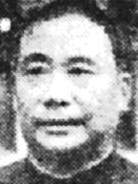
Deng Xihou |
Deng Xihou (b. 1889, Yingshan, Sichuan, China - d. March 30, 1964, Chengdu, Sichuan), civil (1924-25) and military (1926-27) governor and chairman of the government (1947-48) of Sichuan. Having graduated from Baoding Military Academy, he became a general subordinated to Sichuan Gov. Liu Cunhou. His forces turned to the National Revolutionary Army in 1926, when he was designated commander of the 28th Army. He was sent to the 45th Army in 1927, moonlighting as director of the Sichuan Provincial Financial Bureau. During World War II, he was named commander-in-chief of the 22nd Army Group. On Feb. 10, 1949, Deng, together with Gen. Liu Wenhui and Pan Wenhua, crossed over to the Communists in Peng county, Sichuan. He took up the Water Conservancy Ministry after the Communist victory, and then became vice-governor of Sichuan.

Deng Yanda |
Deng Yanda (b. 1895, Huiyang, Guangdong, China - d. Nov. 29, 1931, Nanjing, Jiangsu, China), civil governor of Hubei (1926-27). He was a regiment commander in the revolutionary-minded Guangdong army. In 1924, he was appointed chief dean of the Huangpu Military College (whose president was Chiang Kai-shek) and president of the Chaozhou-Shantou branch of that college. He also participated in the Northern Expedition, being the director of the political department of the northbound army. In 1927, Chiang, leader of the Kuomintang rightists and of the whole government, started to strike the Chinese Communist Party, despite the policy of late president Sun Yat-sen, who preferred a close relationship with both the CCP and the U.S.S.R. Chiang also persecuted KMT leftists like Deng who maintained Sun's policy. Deng was arrested on Nov. 17, 1931, in Shanghai, and subsequently executed.
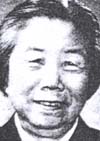
Deng Yingchao |
Deng Yingchao, Wade-Giles romanization Teng Ying-ch'ao (b. Feb. 4, 1904, Nanning, Guangxi, China - d. July 11, 1992, Beijing, China), Chinese politician; wife of Zhou Enlai. Her commitment to expanding women's rights was manifested early in life when she joined the movement to abolish the custom of binding women's feet. She took part in the May Fourth Movement (1917-21), a revolution by young intellectuals aimed at preserving Chinese culture in the wake of Japanese encroachment. When she was 15, she joined the Awakening Society, a liberal student movement headed by Zhou, and was arrested for her radical activities. She joined the Communist Party in 1924. After Deng and Zhou married in 1925, they were forced underground after the Kuomintang massacred their Communist comrades in Shanghai in 1927. They fled to Moscow before returning (1930) to Shanghai, where they joined the epochal Long March (1934-35). Deng was one of only 50 women on the 10,000-km trek and was carried on a stretcher for hundreds of kilometres after contracting tuberculosis. While seeking medical attention in Beijing in 1936, she eluded detection by posing as U.S. journalist Edgar Snow's servant. After the Communist victory in 1949, she was revered as the nation's "elder sister." She was instrumental in promoting women's rights, and in 1956 she became a member of the Communist Party Central Committee. After her husband's death (1976), she became a high-ranking official and emerged, like her husband, as a much beloved figure. She was one of the vice-chairmen of the Permanent Standing Committee of the National People's Congress during the 1976-78 vacancy in the office of chairman, at a time when the committee was exercising the functions of head of state. She was given (1978) a seat on the Communist Party's Political Bureau and served (1983-88) as head of the Chinese People's Political Consultative Conference. A party loyalist, she advocated the use of military force against the student-led 1989 pro-democracy movement.
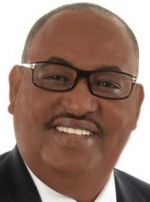
Deni |
Deni, Said Abdullahi, byname of Said Abdullahi Mohamed (b. 1967), president of Puntland (2019- ). He was also Somalian minister of planning (2014-16).
Deniau, Jean-François (b. Oct. 31, 1928, Paris, France - d. Jan. 24, 2007, Paris), French politician. He was ambassador to Mauritania (1963-66) and Spain (1976-77), European commissioner for external trade (1967-70), enlargement and development aid (1970-73), and development policy and budgets (1973), and minister of external commerce (1978-80).
Denic, Pavle (b. April 28 [April 16, O.S.], 1855, Belgrade, Serbia - d. 1939), acting foreign minister of Serbia (1903). He was also Belgrade's city chief (1892-93) and minister for construction (1902-03) as well as consul in Salonica and Skopje.
Denikin, Anton (Ivanovich) (b. Dec. 16 [Dec. 4, O.S.], 1872, near Warsaw, Poland, Russian Empire - d. Aug. 8, 1947, Ann Arbor, Mich.), commander-in-chief of the anti-Bolshevik ("White") forces in Russia (1920). He joined the Imperial Russian Army at age 15 and served in the Russo-Japanese War (1904-05) and in World War I (1914-16). After the February Revolution of 1917, which overthrew the Romanov dynasty, he became chief of staff to the provisional government's commander in chief, Mikhail Alekseyev, but was quickly disillusioned by that government's inability to maintain discipline in the army. He was dismissed from his post in July for political reasons. Placed in command of the western front, he came into close contact with Gen. Lavr Kornilov, then the Russian supreme military commander, and in August 1917 the two were arrested for conspiring to overthrow the provisional government and establish a military dictatorship. A month after the Bolsheviks' October Revolution, however, they escaped from prison and fled southward to the Don River region, where Kornilov assumed command of the White Army recently formed by Alekseyev. When Kornilov was killed in April 1918, Denikin became commander of the White forces in southern Russia. By the beginning of 1919 he controlled the northern Caucasus; in May he begun an advance on Moscow, but in October the Red Army defeated him at Oryol (400 km from Moscow) and forced him to retreat with his disintegrating army to Novorossiysk; the remainder of his army was then evacuated to the Crimea (March 1920). In April he turned over his command to Gen. Pyotr Nikolayevich Wrangel and fled to Istanbul. He was offered asylum in England, but preferred to go to Brussels. Later he lived in France and, from 1945, in the U.S. He was reburied in Moscow in 2005.
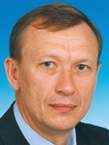
Denin |
Denin, Nikolay (Vasilyevich) (b. May 15, 1958, Domashovo village, Bryansk oblast, Russian S.F.S.R.), governor of Bryansk oblast (2004-14).
Denis, Henri (Jean Charles Eugène) (b. Sept. 10, 1877, Marbais, Belgium - d. Jan. 19, 1957, Brussels, Belgium), defense minister of Belgium (1936-40).

Hervé Denis |
Denis, Hervé (Yvan) (b. Dec. 29, 1939, Port-au-Prince, Haiti - d. April 21, 2002, Pétionville, Haiti), Haitian politician. Denis, who had been active as actor and director in avant-garde theatre productions in France in the 1970s, returned to his homeland in the early 1980s. Arrested by the secret police of dictator Jean-Claude Duvalier, he was beaten and released after several days in detention. From 1993 to 1994, Denis was culture and communication minister under Pres. Jean-Bertrand Aristide, in exile in the United States during the 1991-94 period of military-backed rule. Denis joined Aristide in exile several months before a U.S. intervention restored Aristide to power in September 1994 and returned with him to their homeland. Pres. René Préval, who succeeded Aristide in 1996, twice nominated Denis to be prime minister (1997, 1998) but the Haitian parliament, in a power struggle with Préval, refused to confirm his choice. Denis fell out with Aristide, denouncing his allegedly dictatorial tendencies, and briefly contemplated running against him in the November 2000 presidential race boycotted by the opposition after flawed local and legislative elections.
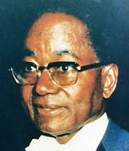
Denise |
Denise, Auguste (b. Feb. 3, 1906, Tiassalé, Ivory Coast - d. Jan. 20, 1991, Paris, France), vice president of the Government Council (1957-58), president of the Government Council (1958), and president of the provisional government (1958-59) of Ivory Coast. He was also president of the General Council (1947-50).
Denison, Sir William Thomas (b. May 3, 1804, London, England - d. Jan. 19, 1871, East Sheen, Surrey [now part of London], England), governor of Van Diemen's Land (1847-55), New South Wales (1855-61), and Madras (1861-66) and acting viceroy of India (1863-64); knighted 1846.
Denisov, Andrey (Ivanovich) (b. Oct. 3, 1952, Kharkov, Ukrainian S.S.R.), Russian diplomat. He was ambassador to Egypt (2000-01) and China (2013-22) and permanent representative to the United Nations (2004-06).
Denisov, Georgy (Apollinariyevich) (b. Jan. 8, 1909, Chernovskoye, Perm province, Russia - d. 1996, Moscow, Russia), Soviet politician. He was first secretary of the party committees of Chkalov (1942-48), Kurgan (1950-55), and Saratov (1955-59) oblasti and ambassador to Bulgaria (1960-63) and Hungary (1963-66).
Deniyev, Yakub (Ilyasovich), acting head of the administration of Chechnya (1999-2000). He was also mayor of Grozny (1995-96).
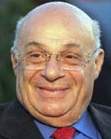
R. Denktas |
Denktas, Rauf (Rasit Raif), also spelled Denktash (b. Jan. 27, 1924, Paphos, Cyprus - d. Jan. 13, 2012, Nicosia [Lefkosa], Cyprus), Cypriot politician. He began representing the Turkish Cypriot community in 1947, during British colonial rule, when he was elected to a consultative committee examining the prospects for independence. As acting solicitor-general during the armed Greek Cypriot struggle against British rule in the 1950s he successfully prosecuted several EOKA fighters who were subsequently hanged. He was elected vice-president of Cyprus on Feb. 16, 1973. When the Turks occupied northern Cyprus on July 20, 1974, he became the head of an interim administration of this part of Cyprus. On Feb. 13, 1975, he became president of the Turkish Federated State of Cyprus and on Nov. 15, 1983, president of the Turkish Republic of Northern Cyprus. His intransigence and refusal to compromise have been blamed for scuppering countless initiatives to solve the Cyprus problem. Ultimately he was criticized by his own Turkish Cypriot community for his inflexibility and what many saw as a failure to modernize or adapt to changing circumstances. He retired in 2005.
Denktas, Serdar (b. 1959, Nicosia, Cyprus), interior minister (1990-92), foreign minister (2004-06), and finance minister (2016-19) of North Cyprus; son of Rauf Denktas. He was also minister of rural affairs and environment (1990-92), youth, sports, and environment (1994-95), tourism and environment (2001-04), and economy, tourism, culture, and sports (2013-15), deputy prime minister (1996-99, 2004-06, 2013-15, 2016-18), and a minor presidential candidate (2020).
Denman, Thomas Denman, (1st) Baron (b. Feb. 23, 1779, London, England - d. Sept. 22, 1854, Stoke Albany, Northamptonshire, England), British acting chancellor of the exchequer (1834). He was also attorney general (1830-32). He was created baron in 1834.
Denman, Thomas Denman, (3rd) Baron (b. Nov. 16, 1874, London, England - d. June 24, 1954, Hove, Sussex, England), governor-general of Australia (1911-14); great-grandson of Thomas Denman, (1st) Baron Denman. He succeeded as baron in 1894.
Dennis, Fernand, finance minister (1924-25, 1940-41) and foreign minister (1940-41) of Haiti. He was also minister to the United States (1941-42).
Dennison, William, Jr. (b. Nov. 23, 1815, Cincinnati, Ohio - d. June 15, 1882, Columbus, Ohio), governor of Ohio (1860-62) and U.S. postmaster general (1864-66).
Denoon, Lennox (Alcindor Carlton) (b. Jan. 31, 1930 - d. June 1, 2007, Scarborough, Tobago), chairman of the Tobago House of Assembly (1989-96).
Dens, Léon (Pierre Alphonse) (b. Oct. 17, 1869, Antwerp, Belgium - d. Nov. 16, 1940, London, England), defense minister of Belgium (1931-32). He was also chairman of the Liberal Party (1935-36).
Dent, Frederick B(aily) (b. Aug. 17, 1922, Cape May, N.J. - d. Dec. 10, 2019, Spartanburg, S.C.), U.S. secretary of commerce (1973-75) and trade representative (1975-77).
Dent Zeledón, Alberto (b. Dec. 11, 1945, San José, Costa Rica), finance minister of Costa Rica (2001-02, 2003-04). He was also agriculture minister (2000-01).
Dentz, Henri Fernand (b. Dec. 16, 1881, Roanne, Loire, France - d. Dec. 13, 1945, Fresnes, Seine [now in Val-de-Marne], France), French high commissioner of Syria and Lebanon (1940-41).
Denys, Odílio (b. Feb. 17, 1892, Santo Antônio de Pádua, Rio de Janeiro, Brazil - d. Nov. 5, 1985, Rio de Janeiro, Brazil), war minister of Brazil (1960-61).
DePaulis, Palmer (Anthony) (b. Jan. 17, 1945, Oakland, Calif.), mayor of Salt Lake City (1985-92).
Depeyre, Octave (Victor) (b. Oct. 15, 1825, Cahors, Lot, France - d. Sept. 29, 1891, Paris, France), justice minister of France (1873-74).
Depretis, Agostino (b. Jan. 31, 1813, Mezzana Corti Bottarone, Kingdom of Sardinia [now Bressana Bottarone, Italy] - d. July 29, 1887, Stradella, Italy), finance minister (1867, 1876-77), prime minister (1876-78, 1878-79, 1881-87), foreign minister (1877-78, 1878-79, 1885, 1887), and interior minister (1878-79, 1879-87) of Italy.
Depreux, Édouard (Gustave Hector) (b. Oct. 31, 1898, Viesly, Nord, France - d. Oct. 16, 1981, Paris, France), interior minister of France (1946-47). He was also minister of education (1948).
Dequae, André (Albrecht Jozef Pauwel) (b. Nov. 3, 1915, Courtrai, Belgium - d. Aug. 17, 2006), finance minister (1961-65) and chairman of the Chamber of Representatives (1974-77) of Belgium. He was also minister of reconstruction (1950), colonies (1950-54), external commerce (1958), and economic coordination (1960-61).

Derache | 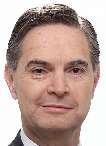
Derbez |
Derache, Hubert (b. Aug. 5, 1953, Morteau, Doubs, France), prefect of Mayotte (2009-11).
Derbez (Bautista), Luis Ernesto (b. April 1, 1947, Mexico City, Mexico), foreign minister of Mexico (2003-06). He was also economy minister (2000-03).
Derbisov, Yerkeshbay (Zhaylaubayevich) (b. Sept. 1, 1941, Koyan-Kus, Alma-Ata oblast, Kazakh S.S.R. - d. Sept. 14, 2000), finance minister of Kazakhstan (1992-94). He was also chairman of the State Committee for Prices (1990-91).
Derby, Edward (George) Geoffrey (Smith) Stanley, (14th) Earl of (b. March 29, 1799, Knowsley, Lancashire, England - d. Oct. 23, 1869, Knowsley), British prime minister (1852, 1858-59, 1866-68). He was also chief secretary for Ireland (1830-33) and war and colonial secretary (1833-34, 1841-45). He was leader of the Conservative Party in 1846-68. He succeeded to the earldom in 1851.
Derby, Edward Henry Stanley, (15th) Earl of (b. July 21, 1826, Knowsley, Lancashire, England - d. April 21, 1893, Knowsley), British foreign secretary (1866-68, 1874-78); son of Edward Geoffrey Stanley, Earl of Derby. He was also secretary of the colonies (1858, 1882-85) and India (1858-59). He succeeded to the earldom in 1869.
Derby, Edward (George Villiers) Stanley, (17th) Earl of (b. April 4, 1865, London, England - d. Feb. 4, 1948, Knowsley, Lancashire, England), British secretary of state for war (1916-18, 1922-24); son of Frederick Arthur Stanley, Earl of Derby. He was also postmaster general (1903-05) and ambassador to France (1918-20). He succeeded to the earldom in 1908.
Derby, Frederick Arthur Stanley, (16th) Earl of (b. Jan. 15, 1841, London, England - d. June 14, 1908, Keston, Kent, England), governor general of Canada (1888-93); son of Edward Geoffrey Stanley, Earl of Derby. He was also British secretary of state for war (1878-80) and colonies (1885-86) and president of the Board of Trade (1886-88). In 1886 he was created Baron Stanley of Preston; he succeeded to the earldom in 1893. The Stanley Cup in ice hockey is named after him.
Deren-Ayerly, Osman Abdul Gani (b. 1898, Deren-Ayir, Tavrida province, Russia - d. 1949), chairman of the Council of People's Commissars of the Crimean A.S.S.R. (1924-26). He was sentenced to 10 years in prison in 1931.
Dérer, Ivan (b. March 2, 1884, Malacka, Hungary [now Malacky, Slovakia] - d. May 10, 1973, Prague, Czechoslovakia [now in Czech Republic]), justice minister of Czechoslovakia (1934-38). He was also minister of Slovak administration (1920), unification of laws (1921-22, 1926), education (1929-34), and health (acting, 1938).
Dergunov, Vasily (Sergeyevich) (b. Jan. 14, 1922 - d. 1989), acting first secretary of the Communist Party committee of the Tatar A.S.S.R. (1982).
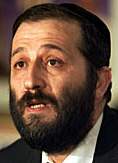
Deri |
Deri, Aryeh (Mahlouf ben Eliahu) (b. Feb. 17, 1959, Meknès, Morocco), Israeli politician. A maker and breaker of governments left, right, and centre, Deri championed the needs of his lower-class Sephardic and ultra-Orthodox power base while at the same time trying to bridge the gaping political and social divides in Israel. For years he found himself in trouble with the law. The rabbi's conviction on corruption charges in April 1999 dealt a blow to Sephardic Jews, who helped build and bolster the Shas party he founded in the mid-1980s. The court ruled he had taken favours at public expense. His most severe conviction was for taking $155,000 in bribes from friends to pay for apartments and trips abroad. In a bid to win cash for its schools and other institutions, Shas leaned to the right in 1996 to join Benjamin Netanyahu's coalition, although Deri had managed also to serve in the previous left-centre government of Labour prime minister Yitzhak Rabin. Deri took his cues from Shas's chief spiritual leader Ovadia Yosef, a former Sephardic chief rabbi. Shas (a Hebrew acronym for Sephardic Torah Guardians) has curried grassroots support by running its own state-subsidized school system, cheap kindergartens, and a youth movement. It also offers moral support, sometimes with no more than a phone call, for families in need. The 1999 sentencing stemmed from Deri's years as director-general of the Interior Ministry and later (1988-93, 1993) as interior minister. Facing indictment, he had resigned as minister in September 1993 but remained in parliament. While minister, he won backing from Israel's Arabs by speaking up for their needs. His party's willingness to support swapping land for peace with the Arabs also made Shas popular among Israel's Arabs. Sentenced to three years in prison in 2000, he actually served just under two years before being set free in July 2002. Returning to the Knesset in 2013, he became minister of economy (2015), development of Negev and Galilee (2015-20), interior again (2016-21, 2022-23), religious services (2018), and health (2022-23). In 2023 the Supreme Court disqualified him as minister due to the fact that he intentionally misled a court in 2022 when he promised that he would not rejoin politics, in order to receive a lenient plea bargain on tax offenses.
Dériaud, Charles Paul (b. July 14, 1911 - d. Feb. 21, 1964), acting lieutenant governor of Middle Congo (1958-59).
Dering, (Dabar Nag) Koumaba (b. 1948, Dissoua, near Kelo, Chad - d. [executed] 1979), foreign minister of Chad (1979).
Dern, George H(enry) (b. Sept. 8, 1872, near Scribner, Neb. - d. Aug. 27, 1936, Washington, D.C.), governor of Utah (1925-33) and U.S. secretary of war (1933-36).
Dernburg, Bernhard (Jakob Ludwig) (b. July 17, 1865, Darmstadt, Hesse-Darmstadt [Germany] - d. Oct. 14, 1937, Berlin, Germany), finance minister (1919) and vice chancellor (1919) of Germany. He was also director of the Colonial Office (1906-07) and minister of colonies (1907-10).
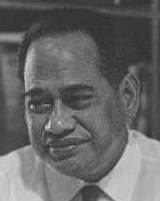
DeRoburt |
DeRoburt, Hammer (b. Sept. 25, 1922, Nauru - d. July 15, 1992, Melbourne, Australia), president of Nauru (1968-76, 1978-86, 1986, 1986-89). After Japanese forces invaded Nauru in 1942, he was deported (along with most of the population) to Truk (now Chuuk) in Micronesia until 1946. His election to the Nauru Local Government Council (NLGC) in 1951 was disallowed on a technicality, but he was returned in 1955 and then elected head chief of Nauru. Under DeRoburt the NLGC became the vehicle for the pursuit of Nauruan aspirations. He proved to be a hard negotiator with a shrewd appreciation of his opponents' weaknesses and of their capacity to pay. After Nauru had won increased royalties and then, in the mid-1960s, an agreement for control of the phosphate industry, independence and termination of the Australian-administered UN trust followed as a matter of course in 1968. Nearly made president-for-life when the independence constitution was negotiated, he was, in a very real sense, the father of the Nauruan nation. However, to a new generation, secure in the possession of phosphate royalties and political rights, past achievements were no longer sufficient to command unquestioning allegiance. A new, younger administration under Bernard Dowiyogo took office in December 1976 (after a dispute over appointments to the cabinet), but DeRoburt was seldom far away from the centre of political life and resumed the presidency in 1978. He protected the Nauruans' long-term future by the investment of community funds in real estate and shipping. In 1982 he was awarded an honorary knighthood by Britain's Queen Elizabeth II. Except for two brief periods in 1986 when he was temporarily ousted by government opponents, DeRoburt remained in power until August 1989. He remained head chief until the dissolution of the NLGC in March 1992.
Derosi-Bjelajac, Ema, Derosi also spelled Derossi (b. May 3, 1926, Stermazio, Italy [now Strmac, Croatia] - d. June 20, 2020), president of the Presidency of Croatia (1985-86).
Derqui (Rodríguez), Santiago (Rafael Luis Manuel José María) (b. June 19, 1809, Córdoba, Argentina - d. Sept. 5, 1867, Corrientes, Argentina), president of Argentina (1860-61). He was also minister of justice (1854), interior (1854-60), and finance (1859-60).
Derrick, William S(harples) (b. c. July 31, 1802, Westchester, Pa. - d. May 15, 1852, Washington, D.C.), acting U.S. secretary of state (1843).
Derteano, Felipe, finance minister of Peru (1913).
Dertinger, Georg (b. Dec. 25, 1902, Berlin - d. Jan. 21, 1968, Leipzig, East Germany), foreign minister of East Germany (1949-53).
Derussat, Vincent (b. March 22, 1806, Rochefort, Charente-Inférieure [now Charente-Maritime], France - d. ...), commandant of Nossi-Bé (1861-65).
Derussi, Gheorghe (b. Jan. 3, 1870, Bucharest, Romania - d. Dec. 10, 1931, Bucharest), foreign minister of Romania (1921-22). He was also minister to Bulgaria (1913-16) and Sweden, Denmark, and Norway (1917-18, 1919).
Dervisevic, Fikret (b. Sept. 19, 1949, Bihac [now in Federation of Bosnia and Herzegovina]), premier of Una-Sana (2001).
Deryagin, Aleksandr (Vasilyevich) (b. Feb. 19, 1941, Churkinskaya village, Arkhangelsk oblast, Russian S.F.S.R. - d. July 16, 2010), head of the administration of Kaluga oblast (1991-96).
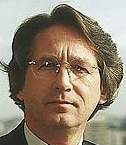
Derycke | 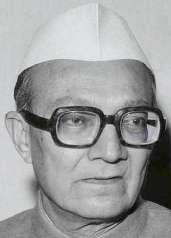
H.K. Desai |
Derycke, Erik (A.N.) (b. Oct. 28, 1949, Waregem, Belgium), foreign minister of Belgium (1995-99). He was also minister (1991) and secretary of state (1991-95) for development cooperation.
Derzhavin, Gavrila (Romanovich) (b. July 14 [July 3, O.S.], 1743, Sokury, Kazan province [now in Tatarstan], Russia - d. July 20 [July 8, O.S.], 1816, Zvanka, Novgorod province [now oblast], Russia), justice minister of Russia (1802-03). A famous poet, he was also governor of Olonets (1784-85) and Tambov (1785-88) and president of the Collegium of Commerce (1794-96, 1800).
des Iles, Annette (Louise) (b. Aug. 24, 1941, Trinidad and Tobago), Trinidad and Tobago diplomat. She was ambassador to Venezuela (1980-84) and Ecuador (1984-85), permanent representative to the United Nations (1992-98), and chairperson of the Alliance of Small Island States (1994-97).
Des Voeux, Sir (George) William (b. Sept. 22, 1834, Baden-Baden, Baden [now in Baden-Württemberg, Germany] - d. Dec. 15, 1909, London, England), administrator of Saint Lucia (1869-78) and governor of Fiji (1880-86), Newfoundland (1886-87), and Hong Kong (1887-91); knighted 1883.
Desai, Hitendra (Kanaiyalal) (b. Aug. 9, 1915, Surat [now in Gujarat], India - d. Sept. 12, 1993), chief minister of Gujarat (1965-71).
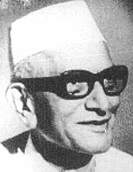
M. Desai |
Desai, Morarji (Ranchhodji) (b. Feb. 29, 1896, Bhadeli [now in Gujarat], India - d. April 10, 1995, Bombay), prime minister of India (1977-79). In 1918 he was appointed to the provincial civil service of Bombay, but resigned in 1930 to join the independence movement. He was arrested several times, spending a total of almost 10 years in prison including a three-year spell from 1942 to 1945. He served in the government of Bombay as home and revenue minister (1946-52) and chief minister (1952-56), where he made his mark as a ruthless administrator and for his imposition of prohibition, which was later lifted. In the Indian government he was named commerce and industry minister in 1956, then finance minister in 1958, a position he resigned in 1963. In 1966 he forced a contest for the prime ministership on the death of Lal Bahadur Shastri. Indira Gandhi won that election but she brought Desai into her cabinet in 1967 as deputy prime minister and finance minister. Sharp differences between the two forced Desai's resignation in 1969 and he became chairman of the opposition Congress Party after it split. He was arrested in 1975 for his political activities and detained in solitary confinement until 1977, whereupon he became active in the coalition Janata Party. That same year, Gandhi unexpectedly held elections after a 19-month suspension of political processes, and Janata achieved a surprising and overwhelming victory. Desai was chosen to be prime minister as a compromise candidate among Janata's leaders. He headed India's first non-Congress government. After two years the Janata coalition, composed of four smaller parties, began to unravel. He resigned on July 15, 1979, after numerous defections in parliament, to avoid a vote of no confidence.
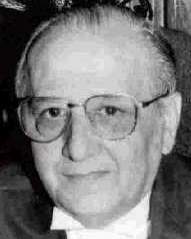
P.D. Desai |
Desai, Prabodh Dinkarrao (b. Dec. 14, 1930, Bharuch [now in Gujarat], India - d. May 17, 2004, Ahmedabad, Gujarat), acting governor of Himachal Pradesh (1986). He was chief justice of the Himachal Pradesh High Court (1983-88), Calcutta High Court (1988-91), and Bombay High Court (1991-92).
Desai, S(haradchandra) K(rishnaprasad) (b. Oct. 27, 1928 - d. Sept. 4, 2011), acting governor of Maharashtra (1987). He was acting chief justice of the Bombay High Court (1987).
Desanti, Jean (Hyacinthe) (b. Jan. 27, 1899 - d. June 27, 1944), acting governor of Dahomey (1934-35) and acting governor (1938-40) and governor (1940-42) of French Sudan.
DeSantis, Ron(ald Dion) (b. Sept. 14, 1978, Jacksonville, Fla.), governor of Florida (2019- ).
Desbordes (Jiménez), Mario (Guillermo) (b. Oct. 15, 1968, Los Andes, Chile), defense minister of Chile (2020).
Descemet, Gabriel (Omer) (b. Dec. 1, 1879, Saint-Louis, Senegal - d. Aug. 21, 1961, Bordeaux, France), acting governor of Mali (1931) and Mauritania (1931-33), lieutenant governor of Upper Volta (1932), and governor of Mauritania (1934).
Deschamps, Hubert (Jules) (b. July 22, 1900, Royan, Charente-Inférieure [now Charente-Maritime], France - d. May 19, 1979, Paris, France), governor of French Somaliland (1938-40), Ivory Coast (1941-42), and Senegal (1942-43).

Deschanel |
Deschanel, Paul (Eugène Louis) (b. Feb. 13, 1855, Schaerbeek [now in Brussels-Capital region], Belgium - d. April 28, 1922, Paris, France), president of France (1920). After a brief term in the prefectorial administration, he was elected to the Chamber of Deputies from the Eure-et-Loir département (1885). He took a seat with the Progressive Republicans and concentrated on social problems and foreign affairs. He served two terms as president of the Chamber of Deputies (1898-1902, 1912-20). When he was elected president of the republic in January 1920, he was the first person with no prior ministerial experience to attain that post. In May 1920 he fell from a train at night near Montargis. The accident was due to overwork; since his election as president he started at 7 o'clock in the morning and often went on to 1 o'clock next morning. In this condition, while fumbling with the window of his sleeping compartment, when half-awake and not knowing what he was doing, he fell out of the train onto the railway line. Miraculously, he suffered little physical injury, but he was never able to recover the health that had been ruined not by the accident but by the long strain that had gone before. He was compelled to resign after only seven months in office.
D'Escoto Brockmann, Francisco José (b. Dec. 8, 1937 - d. Aug. 11, 2017, Managua, Nicaragua), Nicaraguan diplomat; brother of Miguel D'Escoto Brockmann. He was ambassador to the United Kingdom and Portugal (1981-90).
D'Escoto Brockmann, Miguel (Jerónimo) (b. Feb. 5, 1933, Hollywood, Calif. - d. June 8, 2017, Managua, Nicaragua), foreign minister of Nicaragua (1979-90) and president of the UN General Assembly (2008-09). In March 2011 the Libyan government of Muammar al-Qaddafi named him as its permanent representative to the UN.
Desforges, Nicolas (b. June 3, 1955, Neuilly-sur-Seine, Hauts-de-Seine, France), prefect of Guadeloupe (2008-09). He was also prefect of the French départements of Cantal (1997-2001), Eure-et-Loire (2001-04), Manche (2004-05), and Oise (2009-13).
Desforges-Boucher, Antoine (b. c. 1680, Brest, Finistère, France - d. Dec. 1, 1725, Saint-Paul, Île Bourbon [now Réunion]), governor of Île Bourbon (1723-25). Born Antoine Desforges, he changed his name through his life: Antoine Labbé, Labbé Boucher, Antoine Boucher, Antoine Desforges again, and eventually Antoine Desforges-Boucher once at the post of governor of Île Bourbon.
Desforges-Boucher, Antoine Marie (b. April 7, 1713 - d. 1790), governor of Île Bourbon (1749, 1757) and Île de France (1759-67); son of Antoine Desforges-Boucher.
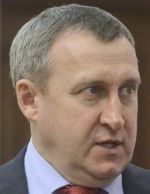
Deshchytsia | 
V. Deshmukh |
Deshchytsia, Andriy (Bohdanovych) (b. Sept. 22, 1965, Lvov, Ukrainian S.S.R. [now Lviv, Ukraine]), acting foreign minister of Ukraine (2014). He was also ambassador to Finland (2007-12), Iceland (2008-12), and Poland (2014-22).
Deshmukh, Chintaman (Dwarkanath) (b. Jan. 14, 1896, Nata village, Bombay province [now in Maharashtra state], India - d. Oct. 2, 1982, Hyderabad, India), finance minister of India (1950-56). He was also governor of the Reserve Bank of India (1943-49). He was knighted in 1944 but later dropped the title Sir.
Deshmukh, Vilasrao (Dagdojirao) (b. May 25, 1945, Babhalgaon [now in Latur district, Maharashtra], India - d. Aug. 14, 2012, Chennai, India), chief minister of Maharashtra (1999-2003, 2004-08). He was also Indian minister of heavy industry and public enterprises (2009-11), rural development (2011), and science and technology (2011-12).
Desimoni, Jorge Aníbal (b. July 10, 1919 - d. Dec. 14, 1992), governor of Santa Fe (1976-81).
Desjardins, (Charles) Alphonse (b. May 6, 1841, Terrebonne, Canada East [now Quebec] - d. June 4, 1912, Terrebonne), defence minister of Canada (1896). He was also mayor of Montreal (1893-94) and minister of public works (1896).
Desjardins, Jean-Flavien Folie, dit, resident of Wallis and Futuna (1951-53).
Deslandes, Philippe (Marie Hubert) (b. Sept. 22, 1946, Criquetot-l'Esneval, Seine-Inférieure [now Seine-Maritime], France), interior minister of Monaco (1998-2006). He was also prefect of the French départements of Eure-et-Loir (1994-95), Val-d'Oise (1995-98), and Marne (2006-08).
Deslandes, Venâncio Augusto (b. May 8, 1909, Lisbon, Portugal - d. 1985), high commissioner of Angola (1961-62). He was also Portuguese ambassador to Spain (1959-61) and chief of staff of the armed forces (1968-72).
Desmet, Michel (Camille Lucien) (b. Aug. 28, 1933, Dunkerque, Nord, France), interior minister of Monaco (1977-84). He was also prefect of the French départements of Yonne (1984-86), Indre-et-Loire (1986-87), Pyrénées-Atlantiques (1987-90), Maine-et-Loire (1990-93), and Somme (1993-95).
Despans-Cubières, Amédée Louis (b. March 4, 1786, Paris, France - d. Aug. 6, 1853, Paris), war minister of France (1839, 1840).
Desperles, Eugène Jean Antoine (b. May 11, 1819, Brest, Finistère, France - d. Nov. 16, 1860, Brest), commandant-particular of Gabon (1848).
Despradel, Arturo (b. June 20, 1900, Puerto Plata, Dominican Republic - d. ...), foreign minister of the Dominican Republic (1938-40, 1946-47). He was also minister to Haiti (1938).
Dessaint, Marcel Édouard Antoine (b. Aug. 26, 1903, Soheit-Tinlot, Liège province, Belgium - d. Jan. 4, 1971, Liège, Belgium), resident of Rwanda (1947-48, 1951-57).
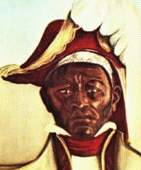
Dessalines |
Dessalines, Jean-Jacques, with first family name (from his owner) Jean-Jacques Duclos, as emperor also Jacques I (b. Sept. 20, 1758, Cormiers plantation, Saint-Domingue [Haiti] - d. Oct. 17, 1806, Pont-Rouge, Haiti), emperor of Haiti (1804-06). Born a slave, he joined the rebellion that broke out in the colony in 1791 amid the turmoil caused by the French Revolution. In the following years he distinguished himself as a shrewd general serving under black leader Toussaint-Louverture, who established himself as governor-general of Saint-Domingue with nominal allegiance to Revolutionary France. In 1802 Napoléon Bonaparte sent an expedition to reconquer the colony, which defeated Toussaint. Dessalines was forced into submission, but when Napoléon in 1803 declared his intention to reintroduce slavery (which had been abolished by the French Convention in 1794), Dessalines and others rose again in rebellion. With British help they expelled the French, and on Jan. 1, 1804, at Gonaïves, Dessalines as governor-general proclaimed the entire island of Hispaniola an independent country under its Arawakan name, Haiti. His acceptance of the title of emperor was announced in September and he was crowned October 8. He confiscated the land of the whites and launched a campaign of extermination against the remaining white inhabitants in which thousands were killed. These massacres, together with his property law (which remained in force for more than a century), effectively prevented any renewal of white dominance over the blacks, who formed more than 80% of the population. He also discriminated against the elitist mulattoes and was finally killed trying to put down a revolt under the mulatto leader Alexandre Sabès Pétion, after which Pétion and the black leader Henry Christophe divided Haiti between them.
Dessande, Beadengar, until about 1975 Pierre Alfred Dessande Tokobe (b. March 28, 1936, Fort-Sibut, French Equatorial Africa [now in Central African Republic]), Chadian politician. He was minister of information and tourism (1968-73) and waters, forests, fishing, and hunting (1973-75) and permanent representative to the United Nations (1975-79).

Dessau |
Dessau, Linda (Marion) (b. May 8, 1953, Melbourne, Vic.), governor of Victoria (2015- ). She is the state's first female and first Jewish governor.
Dessolles, Jean Joseph Paul Augustin, marquis (b. July 3, 1767, Auch [now in Gers département], France - d. Nov. 3, 1828, Saulx-les-Chartreux, Seine-et-Oise [now in Essonne], France), prime minister and foreign minister of France (1818-19). He was created marquis in 1817.
Destenave, Georges (Mathieu) (b. May 17, 1854, Saint-Cricq, Landes, France - d. Dec. 23, 1928, Toulon, France), acting commissioner of Chad (1901-02).
Destenay, (Léon Louis Jean) Georges (b. March 23, 1861, Toulouse, France - d. June 8, 1915, Hanoi, Vietnam), resident-superior of Tonkin (1912-15).
Desterro, João José de Almeida Couto, barão do (b. Dec. 24, 1812, Maragogipe, Bahia, Brazil - d. March 24, 1900, Salvador, Bahia), acting president of Bahia (1871). He was made baron in 1887.
Desyatnik, Leonid (Vasilyevich) (b. Nov. 3, 1956, Novaya Moskva, Orenburg oblast, Russian S.F.S.R.), head of Vostochno-Kazakhstan oblast (1995-96).

Desyatnikov |
Desyatnikov, Vasily (Alekseyevich) (b. Jan. 14, 1942, Berezovka village, Penza oblast, Russian S.F.S.R.), chairman of the Executive Committee (1987-91) and head of the administration (1991-96) of Kirov oblast.
Detenamo, Vinson (Franco) (b. 1954), internal affairs minister (1992-94, 1996, 1996-99) and finance minister (1994-95) of Nauru. He was also minister of works and community services (1989-95, 1996) and minister assisting the president (1989-95, 1996, 1996-99).
Dettori, Paolo (b. Dec. 20, 1926, Tempio Pausania, Sardegna, Italy - d. June 14, 1975, Sassari, Sardegna), president of Sardegna (1966-67).
Detudamo, (Robidok Bagewa) Buraro (b. July 19, 1931, Nauru - d. June 5, 1994), Nauruan politician; son of Timothy Detudamo. He was minister of works and community services (1968-76, 1979-86, 1986, 1986-89), justice (1978), and finance (1978-79) and minister assisting the president (1968-76, 1978-86, 1986, 1986-89).

T. Detudamo |
Detudamo, Timothy (d. April 11, 1953), Nauruan leader. He was head chief of Nauru from 1930 to his death.
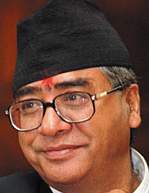
Deuba |
Deuba, Sher Bahadur (b. June 13, 1946, Ruwa Khola Ashigram-5, Dadeldhura district, Mahakali zone, Nepal), prime minister (1995-97, 2001-02, 2004-05, 2017-18, 2021-22) and foreign minister (2001-02, 2004-05, 2017-18, 2021) of Nepal. He was in prison for nine years at different times during 1966-85 due to his involvement in politics. In 1970, with a few friends, he founded the Nepal Students Union, the student wing of the Nepali Congress Party (NC). He played an important role in promoting multiparty democracy in Nepal during the National Referendum in 1980. He was elected to the House of Representatives on a Nepali Congress ticket in the 1991 general election and became the home minister in the NC government formed under the leadership of Girija Prasad Koirala. After early elections in November 1994, Deuba was elected NC leader. In 1995 he headed a three-party coalition comprising the NC, the Rastriya Prajatantra Party (RPP), and the Nepal Sadbhavana Party. The coalition voted out the nation's first elected Communist government by a tally of 107-88 in the parliament. He resigned as prime minister in March 1997 following a no-confidence vote. His government was undermined by charges of corruption and the RPP's allegations that the NC dominated the coalition. He was again appointed prime minister in 2001, but dismissed the following year after he called for a delay of scheduled elections by a year due to mounting Maoist violence. King Gyanendra then suspended the legislature and handpicked his ministers. In April 2004 Deuba was arrested while leading a rally against the king in violation of a ban on public rallies. In June 2004, however, he was reappointed prime minister after increasing agitation for a return to democracy. On Feb. 1, 2005, he was again dismissed and placed under house arrest; he was released on March 11 but rearrested in April and in July sentenced to two years in jail by the Royal Commission for Corruption Control. He was freed on Feb. 13, 2006, after the Supreme Court dissolved the commission. After the establishment of the republic, he became prime minister a fourth time in 2017, now in coalition with the Maoists. While prime minister he also held the portfolios of finance (2002, 2004, 2022), defense (2004, 2021-22), and home affairs (2004, 2017-18).
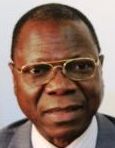
Deubet |
Deubet, Kalzeubé Pahimi (b. Jan. 1, 1957, Guégou, Chad), prime minister of Chad (2013-16). He was also minister of commerce, industry, and crafts (2001), civil service, labour, employment promotion, and modernization (2001-02), justice (2004-05), and communications (2010-11).
Deucher, Adolf (b. Feb. 15, 1831, Wipkingen [now part of Zürich city], Zürich, Switzerland - d. July 10, 1912, Bern, Switzerland), president of Switzerland (1886, 1897, 1903, 1909). He was also president of the government of Thurgau (1880-81), president of the National Council (1882-83), and minister of justice and police (1883), posts and railways (1884), interior (1885), trade and agriculture (1887), industry and agriculture (1888-95), and trade, industry, and agriculture (1896, 1898-1902, 1904-08, 1910-12).
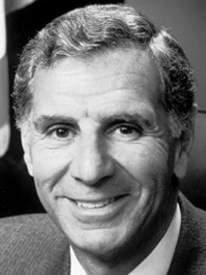
Deukmejian |
Deukmejian, George, in full Courken George Deukmejian, Jr. (b. June 6, 1928, Menands, N.Y. - d. May 8, 2018, Long Beach, Calif.), governor of California (1983-91). First elected to the California Assembly in 1962, he moved to the state senate in 1966 and was named majority leader in 1969. Having early established himself as a Republican conservative, he campaigned against crime, the evils of big government, and collective bargaining for state employees. He was a staunch supporter of capital punishment and once vainly sought to add armed robbery to the list of capital offenses. He drafted a widely praised capital punishment law to replace one invalidated by the U.S. Supreme Court. In the 1970 Republican primary he ran for attorney general and lost. But in 1978 he was nominated for that office and won the general election with about 53% of the vote, again stressing anti-crime legislation and support for the death penalty. Once elected, he scrutinized subordinates' cases to be certain his policies were not being violated. He created a special division to investigate and prosecute organized crime and narcotics dealers. He successfully urged on the legislature a bill to lengthen criminal sentences, and he sharply criticized members of the judiciary whom he considered soft on crime. He announced his decision to run for governor in December 1981. He defeated another conservative, Lt.Gov. Mike Curb, in the June 1982 primary and in the general election went on to defeat, by a slim margin, Los Angeles mayor Tom Bradley. Restoration of fiscal solvency through cuts in spending rather than tax increases was promised in his inaugural address. Most of this was accomplished in the first major piece of legislation he pushed through the Democrat-controlled legislature.
Deuntzer, Johan Henrik (b. May 20, 1845, Copenhagen, Denmark - d. Nov. 16, 1918, Charlottenlund, Denmark), prime minister and foreign minister of Denmark (1901-05).
Deustua (Escarza), Alejandro O(ctavio) (b. March 22, 1849, Huancayo, Peru - d. Aug. 6, 1945, Lima, Peru), prime minister and interior and police minister of Peru (1902). He was also known as a philosopher.
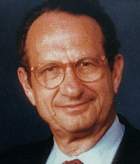
Deutch |
Deutch, John (Mark) (b. July 27, 1938, Brussels, Belgium), CIA director (1995-96). Deutch, naturalized in 1945, worked at the Department of Defense until 1970 and from 1993, and in 1994 he was appointed deputy secretary of defense. He gained praise and political support for his handling of the touchy issue of military base closings while at the Pentagon. In early 1995 Pres. Bill Clinton appointed Deutch the new director of central intelligence; he was confirmed by the Senate on May 9. Although once considered one of the prime jobs in government, this directorship was now viewed as such a difficult and unrewarding position that Deutch had originally turned it down; a personal plea from the president persuaded him to accept the post. Deutch's foremost task was to rebuild the morale and efficiency of what many viewed as an agency in serious trouble. The years following the collapse of the Soviet Union and the subsequent end of the Cold War had not been kind to the CIA. Some critics questioned its purpose in the 1990s; others assailed the agency for its intelligence failures. Meanwhile, the CIA was shaken by internal dissension, which was reflected in a growing rate of resignations among younger officers and in the uncomfortable publicity of a sexual discrimination suit. One of Deutch's first official actions as director was to begin a thorough overhaul of the CIA's upper ranks, replacing most top officials with candidates from outside. He also responded swiftly to allegations of human rights abuses by a Guatemalan army colonel who was also a CIA agent. Deutch fired the former head of Latin-American covert operations and the station chief at the time of the abuses and demoted and reprimanded eight other CIA officers.
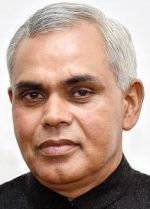
Dev Vrat |
Dev Vrat, Acharya, also spelled Devvrat (b. Jan. 18, 1959), governor of Himachal Pradesh (2015-19) and Gujarat (2019- ).
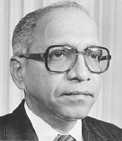
Devan Nair |
Devan Nair, C(hengara) V(eetil) (b. Aug. 5, 1923, Malacca, Straits Settlements [now in Malaysia] - d. Dec. 6, 2005, Hamilton, Ontario, Canada), president of Singapore (1981-85). He joined the Anti-British League, a cover for the Malayan Communist Party, and was detained in 1951 for his activities. Later, when Singapore was merged with Malaysia (1963-65), he was the only elected People's Action Party member of the Malaysian parliament. He formed the Democratic Action Party in Malaysia after the separation of the two countries. Returning to Singapore, he was instrumental in forming the National Trades Union Congress, an umbrella organization for all unions in Singapore. He was elected to the Singapore parliament in 1979. He had to resign as president in 1985 under unclear circumstances. Prime Minister Lee Kuan Yew stated in parliament that Nair resigned to get treatment for alcoholism, which Nair denied. According to Nair's counterclaim, he had resigned under pressure as their political views came into conflict and Lee threatened to seek a motion in parliament to oust him. He moved to Canada in 1995.
Devanayagam, Kanapathipillai William (b. March 26, 1910 - d. Dec. 17, 2002), justice minister (1977-80) and home affairs minister (1980-89) of Sri Lanka.
Develle, Jules (Paul) (b. April 12, 1845, Bar-le-Duc, Meuse, France - d. Oct. 30, 1919, Paris, France), foreign minister of France (1893). He was also prefect of Aube département (1876-77) and agriculture minister (1886-87, 1890-93).
Devens, Charles, (Jr.) (b. April 4, 1820, Charlestown, Mass. - d. Jan. 7, 1891, Boston, Mass.), U.S. attorney general (1877-81).
Dever, Edmonde (b. 1921, Brussels, Belgium - d. 2004), Belgian diplomat. She was ambassador to Sweden (1973-78) and Austria (1978-81) and permanent representative to the United Nations (1981-88).
Dever, Paul A(ndrew) (b. Jan. 15, 1903, Boston, Mass. - d. April 11, 1958, Cambridge, Mass.), governor of Massachusetts (1949-53); cousin of William Emmett Dever.
Dever, William Emmett (b. March 13, 1862, Woburn, Mass. - d. Sept. 3, 1929, Chicago, Ill.), mayor of Chicago (1923-27).
Devès, (Pierre) Paul (b. Nov. 3, 1837, Aurillac, Cantal, France - d. Nov. 12, 1899, Paris, France), justice (and worship) minister of France (1882-83). He was also minister of agriculture (1881-82).
Devesi, Sir Baddeley (b. Oct. 16, 1941, Guadalcanal, Solomon Islands - d. Feb. 16, 2012), governor-general (1978-88), foreign minister (1989-90, 1992), home affairs minister (1990-92), and deputy prime minister (1990-93, 1997-2000) of the Solomon Islands; knighted 1980.
Devèze, Albert (Joseph Charles) (b. June 8, 1881, Ypres, Belgium - d. Nov. 28, 1959, Brussels, Belgium), defense minister (1920-23, 1932-36, 1949-50) and interior minister (1939-40) of Belgium.
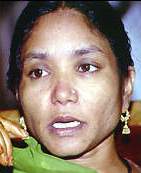
P. Devi |
Devi, Phoolan (b. July 1957 [or Aug. 10, 1963], Gorha Ka Purwa, Uttar Pradesh, India - d. July 25, 2001, New Delhi), Indian politician. Abandoned by her husband at the age of 20, she shortly thereafter was kidnapped by one of the many dacoit (armed bandit) gangs that roamed the ravines of Uttar Pradesh's Chambal River valley. The episode took an unexpected turn when Devi became one of them, finding herself more at home in the company of bandits than she had ever been elsewhere. She became the mistress of Vikram Mallah, one of the gang's leaders, and learned to defend herself. After a year, however, Mallah was treacherously killed by a former friend, who also had Devi captured. She was held for several weeks in a hut in the village of Behmai and nightly was raped and humiliated by several men of the high Thakur caste. When she escaped, she was taken in by another gang, and her notoriety grew. After participating in robberies and ambushes (and badly beating her abusive first husband), Devi had become both one of India's most wanted criminals and a heroine of the oppressed, who called her Dasyu Sundari ("Beautiful Bandit"). She and her gang taunted the authorities, evading capture for two years. Finally, after negotiating terms, she surrendered on Feb. 12, 1983, in a dramatic ceremony witnessed by thousands of her admirers. She was imprisoned for 11 years in Gwalior Central Jail in Madhya Pradesh. After her release in 1994, she abandoned her life of crime. In June 1995 she launched a new political party for the lower castes, Eklavya Manch, and opened the prospect of a new career in politics. She became a member of parliament in 1996, winning with a wide margin. She was gunned down by three masked men when she returned home for lunch from a session of parliament.
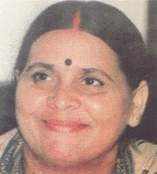
R. Devi |
Devi, Rabri (b. 1959), chief minister of Bihar (1997-99, 1999-2000, 2000-05); wife of Laloo Prasad Yadav.

V.S.R. Devi | 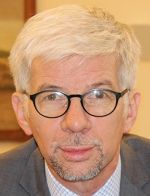
Devimeux |
Devi, V.S. Rama (b. Jan. 15, 1934, Chebrolu, Madras [now in Andhra Pradesh], India - d. April 17, 2013, Bangalore [now Bengaluru], India), governor of Himachal Pradesh (1997-99) and Karnataka (1999-2002). She was also chief election commissioner of India (1990).
Deville de Perière, Marie Auguste (b. Aug. 29, 1825, Basse-Terre, Guadeloupe - d. ...), acting governor of Senegal (1881).
Devimeux, Thierry (b. Aug. 30, 1960, Fontainebleau, Seine-et-Marne, France), prefect of Saint-Pierre and Miquelon (2018-21). He has also been prefect of the French département of Ardèche (2021- ).
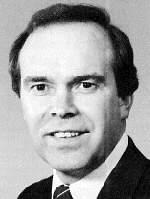
Devine |
Devine, (Donald) Grant (b. July 5, 1944, Regina, Sask.), premier of Saskatchewan (1982-91). In the late 1970s he decided to enter politics. In November 1979 he became the leader of the Progressive Conservative Party of Saskatchewan, winning on the first ballot at the nominating convention. Winning a seat in the Saskatchewan legislature was not as easy. After losing in elections in 1978 and 1980, he was put in the ignominious position of leading his party from a seat in the legislative gallery. In the provincial election of April 26, 1982, the Progressive Conservative Party won 57 of the 64 seats in the provincial legislature, the largest majority in Saskatchewan history, and Devine finally won a seat as the representative for the riding of Estevan. Thus he could form a government and become premier of the province. Once elected, he moved quickly to implement his campaign promises. The legislature abolished the provincial road tax on gasoline and instituted a program giving mortgage relief to homeowners. Saskatchewan was thus provided with the cheapest gasoline and home mortgages in Canada.
Devold, Kristin Krohn (b. Aug. 12, 1961, Ålesund, Møre og Romsdal, Norway), defense minister of Norway (2001-05).
Devollan, Frants (Pavlovich), French François de Wollant (b. Sept. 20, 1752, Austrian Netherlands [now Belgium] - d. Dec. 12 [Nov. 30, O.S.], 1818, St. Petersburg, Russia), Russian official. He was head of the Chief Administration of Communications (1812-18).
Devonshire, Spencer Compton Cavendish, (8th) Duke of, courtesy title (1858-91) Marquess of Hartington (b. July 23, 1833, Lower Holker, Lancashire, England - d. March 24, 1908, Cannes, France), British secretary of state for war (1866, 1882-85). He was also postmaster-general (1868-71), chief secretary for Ireland (1871-74), leader of the Liberal Party (1875-80) and the Liberal Unionists (1886-91) in the House of Commons, secretary of state for India (1880-82), and lord president of the council (1895-1903). He succeeded as duke in 1891.
Devonshire, William Cavendish, (3rd) Duke of (b. Sept. 26, 1698 - d. Dec. 5, 1755), lord lieutenant of Ireland (1737-45). He was also British lord privy seal (1731-33). He succeeded as duke in 1729.
Devonshire, William Cavendish, (4th) Duke of, courtesy title (1729-51) Marquess of Hartington (baptized June 1, 1720, Westminster, England - d. Oct. 2, 1764, Spa, Austrian Netherlands [now Belgium]), lord lieutenant of Ireland (1755-56) and British prime minister (1756-57); son of William Cavendish, (3rd) Duke of Devonshire. He was also lord chamberlain (1757-62). He became Baron Cavendish by writ in acceleration in 1751 and succeeded as duke in 1755.
Devoto Arrizaga, Luis (b. May 17, 1854, Ancud, Chile - d. May 24, 1920), finance minister (1909, 1916) and war and navy minister (1912) of Chile.
Devpura, Heera Lal (b. 1925, Kelwara village [now in Udaipur district, Rajasthan state], India - d. Dec. 23, 2004, Jaipur, Rajasthan), chief minister of Rajasthan (1985).
Dewael, Patrick (Yvonne Hugo) (b. Oct. 13, 1955, Lier, Belgium), minister-president of Flanders (1999-2003) and interior minister (2003-08) and chairman of the Chamber of Representatives (2008-10, 2014, 2019-20) of Belgium.

Dewang |
Dewang (Wade-Giles Te Wang), original name Demcuk Dongrup (b. Feb. 8, 1902, Right Sonid Banner, Xilingol League, Inner Mongolia, China - d. May 23, 1966, Hohhot, Inner Mongolia, China), leader of Inner Mongolia (1934-49). He was a county chief in his earlier life. In 1936, under the assistance of Japanese invaders, he founded a "Mongolian Military Government" under his leadership, also becoming commander-in-chief of the "Mongolian Army." His post was recognized by the Kuomintang government after World War II, so he was able to continue his reign in Inner Mongolia. In August 1949, when Kuomintang forces had been expelled from Inner Mongolia by the Communists, he organized a "Mongolian Khural" and an "Autonomous Government," trying to boycott the Communist control over Inner Mongolia and seeking its independence. He fled to the Mongolian People's Republic in December that year, but was extradited back and detained in 1950. He received an amnesty in March 1963.
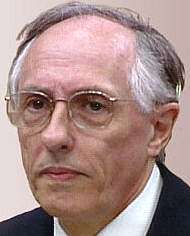
Dewar |
Dewar, Donald (Campbell) (b. Aug. 21, 1937, Glasgow - d. Oct. 11, 2000, Edinburgh), first minister of Scotland (1999-2000). Dewar was a Labour Party member of the British Parliament for Aberdeen South (1966-70) and for Glasgow Garscadden (1978-2000). When Labour was the opposition, he served as the party's parliamentary spokesperson on Scottish affairs from 1983 to 1992 and on social security from 1992 to 1995. When Labour regained power in 1997, he became the secretary for Scotland, and when the new Scottish parliament formed in 1999 he became the first First Minister. He was noted among politicians of all stripes for his intelligence, integrity, oratory, diligence, loyalty, and sly wit. Dewar played a key role in the "devolution" process he pursued for more than thirty years that gave Scotland its own parliament and a measure of home rule. It was an important part of his vision that Scotland become a more tolerant place, and without his leadership it is most unlikely that the Scottish parliament in 2000 would have repealed Section 28 (titled Clause 2A in Scotland), the Thatcher-era prohibition against local governments devoting resources to the "promotion" of homosexuality (the "no promo homo" law). The British government failed in its own repeal effort. Repeal opponents mounted a media campaign unprecedented in the U.K., led by Roman Catholic Cardinal Thomas Winning and funded by the deep pockets of transportation magnate Brian Souter, a campaign that stirred fears, division, and personal attacks, but Dewar held the executive and the parliament firm in their resolve against discrimination. Dewar died from a brain haemorrhage following a fall on the steps of his official residence.
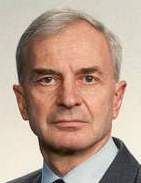
Dewatre | 
Dewes |
Dewatre, Jacques (Marie Jean René) (b. June 5, 1936, Limoges, Haute-Vienne, France), prefect of French Guiana (1986-88) and Réunion (1991-92). He was also prefect of the départements of Saône-et-Loire (1988-91) and Yvelines (1992-93) and ambassador to Ethiopia (2000-01).
Dewdney, Edgar (b. Nov. 5, 1835, Bideford, Devonshire, England - d. Aug. 8, 1916, Victoria, B.C.), lieutenant governor of the Northwest Territories (1881-88) and British Columbia (1892-97) and interior minister of Canada (1888-92). He was also superintendent-general of Indian affairs (1888-92).
Dewes (Tarawhiti), Tui (Elizabeth) (b. Nov. 2, 1979, Lower Hutt, N.Z.), high commissioner of the Cook Islands (2020- ).

Dewey |
Dewey, Thomas E(dmund) (b. March 24, 1902, Owosso, Mich. - d. March 16, 1971, Bal Harbour, Fla.), governor of New York (1943-55) and U.S. presidential candidate (1944, 1948). In 1935 he was appointed by the governor of New York as special prosecutor in an investigation of organized crime; in little more than two years he had convicted 72 racketeers, with only one defendant being acquitted. Elected district attorney in 1937, he continued to impress the electorate with his legal acumen and with his personal drive and integrity. Although unsuccessful in his first bid for governor (1938), he was elected to three successive terms beginning in 1942. In office he earned a reputation for political moderation and administrative efficiency, putting the state on a pay-as-you-go basis for capital building, reorganizing departments, and establishing the first state agency to eliminate discrimination in employment. As Republican nominee for president in 1944, he was neither expected nor able to overcome the enormous wartime prestige of Pres. Franklin D. Roosevelt. The pollsters flatly predicted victory for his candidacy in 1948, however; they did not bother to take any soundings for more than a week before the election. But Dewey, who waged a noncommittal campaign designed to avoid offending any segment of the electorate, "snatched defeat from the jaws of victory" in one of the nation's greatest political upsets as Pres. Harry S. Truman retained more of the farm and labour vote than expected. As a leader of the eastern Republicans at the 1952 national convention, Dewey played a key role in the nominations of Gen. Dwight D. Eisenhower for president and Sen. Richard M. Nixon for vice president and remained a close adviser to Republican administrations.
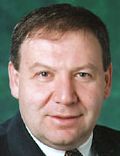
D. Dexter |
Dexter, Darrell (Elvin) (b. Sept. 10, 1957, Halifax, N.S.), premier of Nova Scotia (2009-13).
Dexter, Samuel (b. May 14, 1761, Boston, Massachusetts Bay [now Mass.] - d. May 4, 1816, Athens, N.Y.), U.S. secretary of war (1800-01) and the treasury (1801).
Deyine, Sidi Mohamed Ould, interior minister (1961-62) and foreign minister (1963-65) of Mauritania. He was also minister of education, youth, and labour (1959-61).
Deynego, Vladislav (Nikolayevich) (b. March 12, 1964, Romny, Sumy oblast, Ukrainian S.S.R.), foreign minister of the Lugansk People's Republic (2017-22).
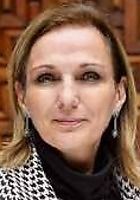
Deza |
Deza (Ferreccio), Franca (Lorella) (b. June 4, 1959), foreign minister of Peru (2020).

Dhami | 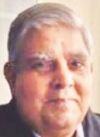
Dhankhar |
Dhami, Pushkar Singh (b. Sept. 17, 1975, Tundi, Pithoragarh district, Uttar Pradesh [now in Uttarakhand], India), chief minister of Uttarakhand (2021- ).
Dhankhar, Jagdeep (b. May 18, 1951, Kithana, Jhunjhunu district, Rajasthan, India), governor of West Bengal (2019-22) and vice president of India (2022- ).
Dharsono, Hartono (Rekso) (b. June 10, 1925, Pekalongan, Netherlands East Indies [now Indonesia] - d. June 5, 1996, Bandung, Indonesia), secretary-general of ASEAN (1976-78). He started a military career as team commander, platoon commander, and battalion commander in West Java's Siliwangi Division during the Indonesian war of independence (1945-49). He was the brigade staff in Siliwangi before being assigned to the General Staff of the Army (1954-56) and then became the deputy governor of the Military Academy (1956-59). The post of Siliwangi Chief of Staff was occupied by him twice, in 1960 and 1964-65. General Dharsono also served as military attaché in London (1962-64) and third assistant to the army commander (1965-66) before becoming Siliwangi commander (1966-69). Then he was assigned as ambassador to Thailand (1969-72) and Cambodia (1972-75) and as chairman of the International Commission for Control and Supervision to end the Vietnam War (1973-75). His last position in the government was ASEAN secretary-general. The retired three-star general was detained on Nov. 8, 1984. The Central Jakarta Court, in a trial that started Aug. 19, 1985, sentenced him on Jan. 8, 1986, to 10 years imprisonment. Jakarta Court then reduced his sentence to seven years after he appealed. The Supreme Court reaffirmed the seven-year sentence. He was found guilty for political and subversive crime, i.e., attending meetings in 1984 which were considered to be related to the bombing of Glodok Shopping Center and Bank Central Asia (BCA) in the same year. He did his time at Cipinang Correctional Facility. He was freed on Sept. 16, 1990, after being in prison for five years. He could be released early because he received remissions every August 17 (Indonesian independence day).
Dhavan, Shanti Swaroop (b. July 2, 1905 - d. Aug. 4, 1978), governor of West Bengal (1969-71). He was also Indian high commissioner to the United Kingdom (1968-69).
Dhebar, Uchharangray Navalshankar (b. Sept. 21, 1905, Gangajala [now in Gujarat], India - d. 1977), chief minister of Saurashtra (1948-54). He was president of the Indian National Congress in 1955-60.
Dhillon, G(urdial) S(ingh) (b. Aug. 6, 1915, Panjwar, Punjab, India - d. March 23, 1992, New Delhi, India), Indian politician. He was speaker of the Lok Sabha (1969-75), minister of transport and shipping (1975-77) and agriculture and rural development (1986-88), and high commissioner to Canada (1980-82).

Dhlakama |
Dhlakama, Afonso (Marceta Macacho) (b. Jan. 1, 1953, Mangunde, Mozambique - d. May 3?, 2018, Gorongosa, Mozambique), Mozambican politician. He was the leader from 1979 of Renamo, a guerrilla organization which transformed into the country's main opposition party. He was a presidential candidate in 1994, 1999, 2004, 2009, and 2014.
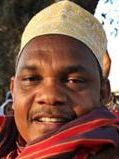
Dhoinine | 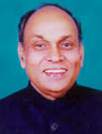
Dhumal |
Dhoinine, Ikililou (b. Aug. 14, 1962, Djoiézi, Mohéli, Comoros), provisional president of Anjouan (2008) and a vice president (2006-11) and president (2011-16) of the Comoros.
Dhumal, Prem Kumar (b. April 10, 1944, Samirpur [now in Himachal Pradesh], India), chief minister of Himachal Pradesh (1998-2003, 2007-12).















































































































